

Importance of Market Research: 9 Reasons Why It’s Crucial for Your Business

Free Website Traffic Checker
Discover your competitors' strengths and leverage them to achieve your own success
Every business, regardless of its size or nature, requires market research to thrive. It forms the basis through which businesses get to understand their customer’s needs, the dynamics of the market, and the activities of their competitors within the market.
One thing that all successful businesses share in common is that they all rely on effective market research to make informed decisions, design products that meet consumer demand, and uncover new growth opportunities. However, a recent report by Nevada Public Radio reveals that 1 in 4 businesses fail within their first year. This highlights the importance of conducting smart market research to identify potential pitfalls and increase your chances of success.
In this post we explore why and how market research is vital for any business to thrive.

1. Make informed business decisions
One significant aspect of market research is that it enables a company to gather data to make effective decisions. It offers insight that minimizes the guesswork in understanding the market needs, customer preferences, and the competitive landscape . For example, an analysis of the traffic to a website can show which products most visitors are interested in. This will, in turn, provide a guide for inventory decisions, and at the same time, it shapes marketing efforts toward products with high demand. By relying on data-driven insights, businesses can reduce the risk of making costly mistakes, ensuring more effective decision-making that directly contributes to increased profitability and long-term success.
An appropriate market research strategy might identify the areas of customer pain points that otherwise may not be immediately recognizable. Suppose that a company is about to release a new software product. Thorough research will identify potential users’ frustrations with such an application and enable the development team to take steps to forestall these issues. It guides product development and eventually enhances customer satisfaction and retention.
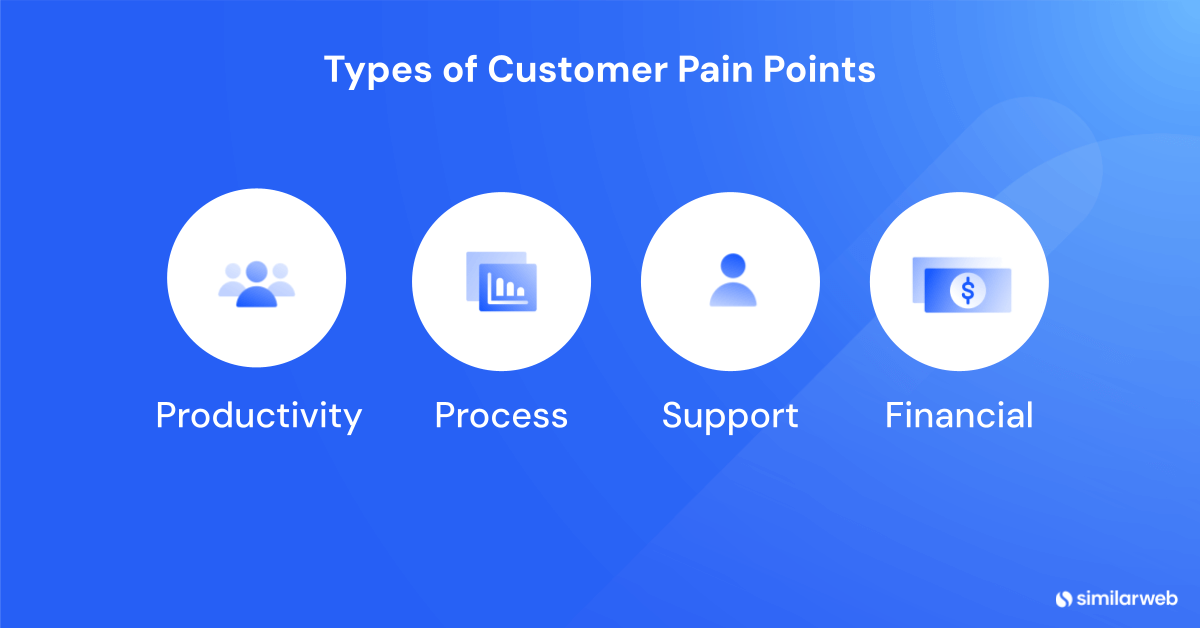
This information can also help in setting prices. Knowing the amount your target market is willing to pay for a product or service, means you can plan your pricing model accordingly. It not only affects profitability but also your product’s market positioning.
Similarly, research regarding the prices of competitors’ products and the reaction of customers to those prices will give you clear benchmarks that can be used to entice customers by reduced pricing and have enough margin built in to ensure a healthy profit.
2. Formulate market strategies
Effective market strategies are preceded by effective research, highlighting the importance of conducting market research. It helps businesses understand the target market, its potential, and how best to reach them. This understanding will help firms design ways that will appeal to the target group and thus produce successful campaigns with increased participation of customers. Whether through surveys and focus groups or detailed market analysis , market research is very instrumental in crafting marketing messages and strategies in line with consumer demands.
Consider a US-based fashion retailer planning to enter a new market in Europe. Through extensive market research, they can identify the styles and trends preferred by European consumers, as well as their purchasing behaviors in general, allowing them to tailor their product lines to better meet local demand.
It also becomes instrumental in market segmentation , which means that market research helps a business to come up with marketing campaigns that directly speak to each of the identified customer segments based on their needs. This kind of segmentation results in highly personalized marketing efforts, leading to higher engagement rates and, ultimately, a greater return on investment (ROI).
Research helps not only in developing strategies but also in evaluating their success. After implementing a strategy, tools like customer feedback and sales analysis reveal what worked and what didn’t. Regular assessment and performance analysis allow you to ensure continuous improvement and online growth.
3. Stay ahead of the competition
Knowing what the competition is doing is very important in staying ahead. Comparative analyses may show where a company can perform better than its competitors and occupy a niche. This competitive analysis is necessary for deriving strategies that capitalize on such insights and drive growth.
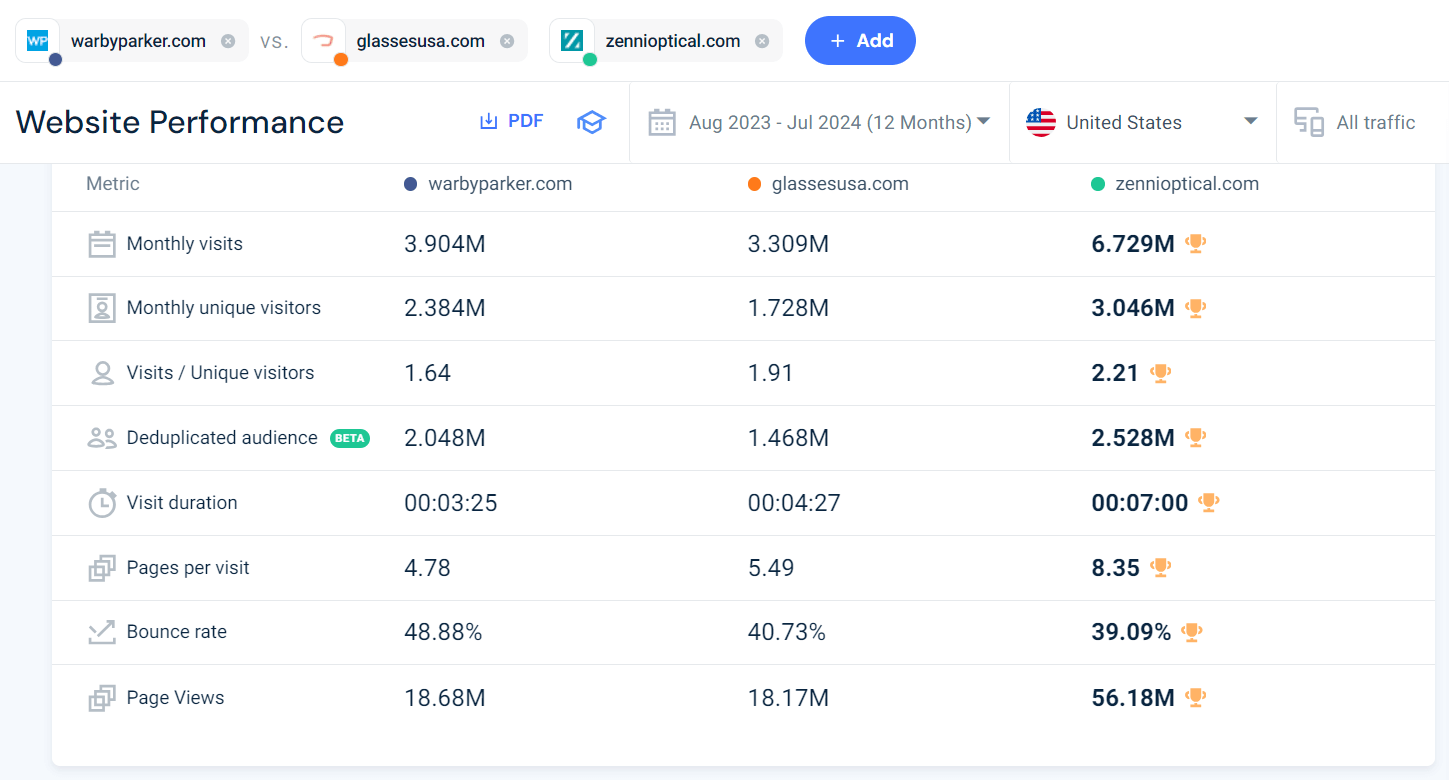
Competitive analysis requires that you identify the Unique Selling Points (USPs) that are offered by your competitors. Having an understanding of what makes customers buy a certain competitor’s product or service would arm your business with the knowledge to create equally compelling USPs. If the strength of a competitor lies in high-quality customer service, then your business may concentrate on either superior product quality or some unique features.
Competitive analysis could also reveal market saturation levels and this can be very beneficial in terms of market entry. For instance, a player entering the smartphone market would like to know who the big guys and/or the underserved niches are. This kind of information may help in developing products and marketing strategies toward serving those underserved niches for success.
4. Identify new products and services
Recognizing what the market needs is the force behind the drive in the new product and service development process. Knowing what is needed but not provided will set your business apart in an overcrowded market. As a simple example, some tech innovators often turn to market research as a guide for finding those pain points that existing products don’t touch. A company developing a new fitness app might learn from research that users want more customized workout plans. This may drive further development and help to create one of its differentiating features.
Market research can also uncover emerging trends that point to rising consumer needs, allowing businesses to stay ahead of the competition by developing products or services that fulfill these demands before others do.
During the research phase, customer feedback is very instrumental in fine-tuning new products and services. Direct feedback concerning the prototype or beta version will bring probable issues to light before its full launch. This reduces the risk of failure and checks that the final product is appropriate for its target market.
5. Boost marketing performance
Understanding why market research is so important helps in refining and targeting campaigns through relevant data. It informs businesses about the most effective marketing channels , optimal campaign timing, and messaging that resonates with the audience. Leverage market research tools like Similarweb and employ strategies such as audience analysis, market mapping, and benchmarking to ensure every marketing dollar delivers maximum impact.
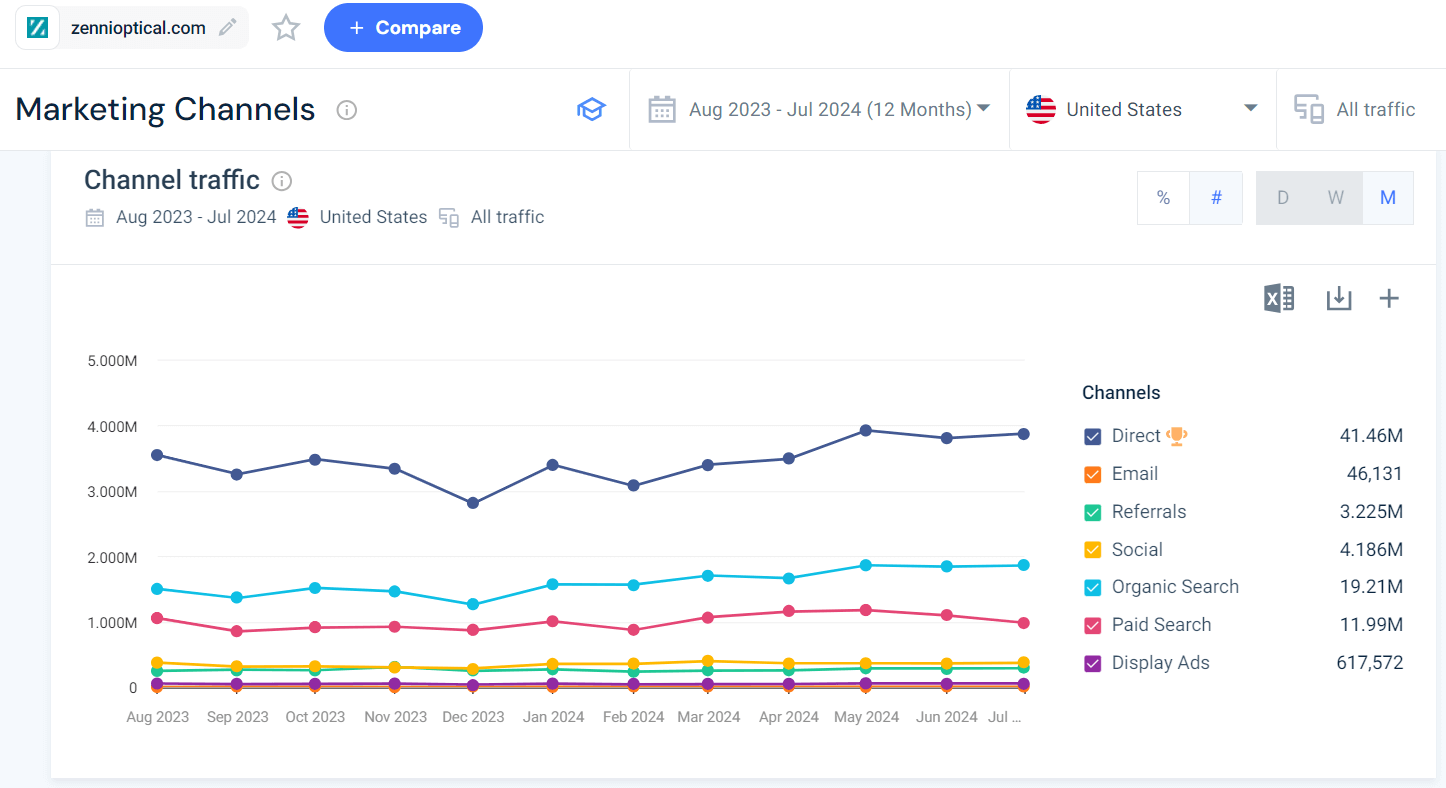
One core benefit is identifying how and where your audience consumes information. Researching this can reveal preferred channels. For example, targeting millennials might reveal that platforms like Instagram and TikTok are more effective than traditional media. With this insight, you’ll be able to allocate marketing budgets toward platforms that promise the highest return.
Timing is also influenced by market research. Having an idea when your audience engages the most can significantly impact campaign success. Research might show that your market is most active online during weekends, and this suggests that ad campaigns should coincide with these peaks in activity.
Moreover, proper market research can accurately measure the success of your marketing efforts. Tracking key performance indicators (KPIs) like conversion and click-through rates helps you assess what works and what doesn’t. This feedback loop allows continuous refinement and optimization of strategies.
6. Get to know your audience
Through market research, you become informed about the demographics, behaviors, preferences, and purchasing habits of your customers. This information will help you adjust your products, services, and messages accordingly. In doing audience analysis , businesses can segment their target audience , and work on campaigns that elicit engagement and loyalty.
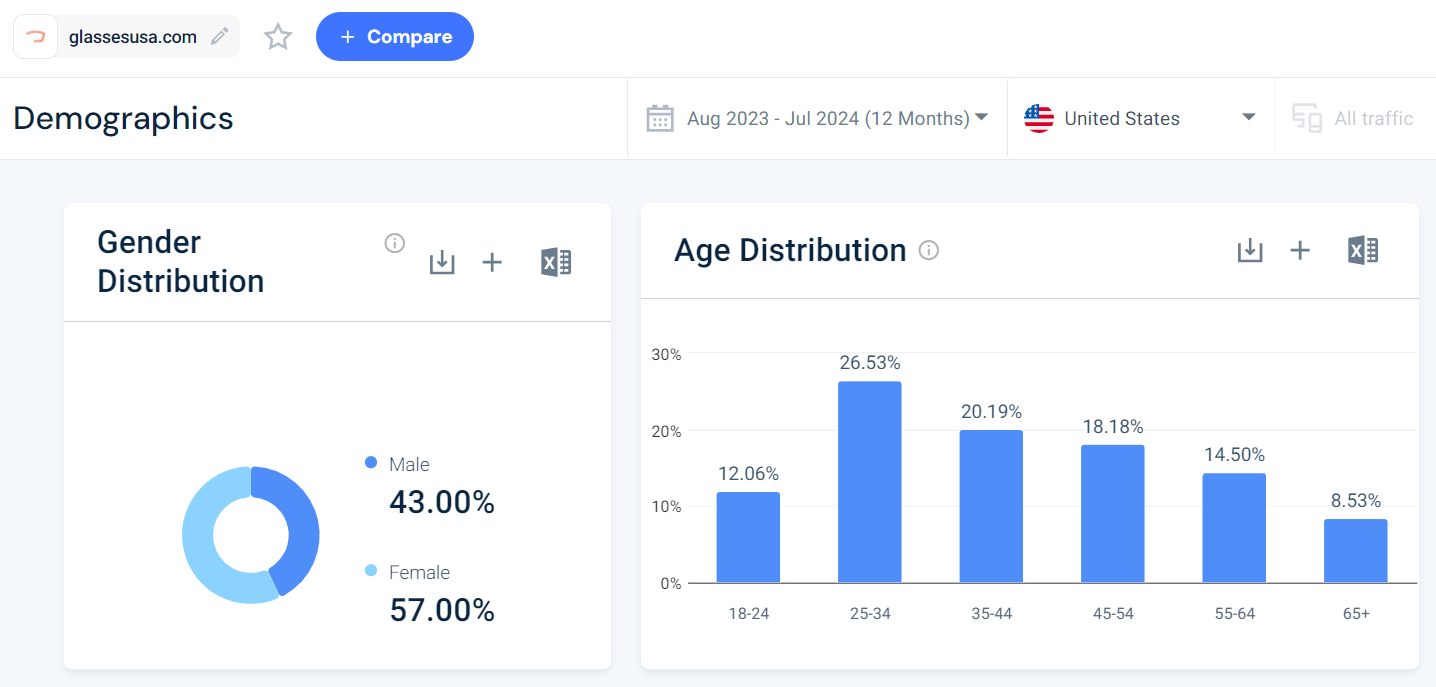
This tactic allows campaigns to be targeted by knowing who the ideal customers are. For example, a premium pet food brand may understand that its ideal customers are young professionals who view their pets as family. This knowledge guides the crafting of marketing messages that are focused on quality ingredients and health benefits, which speak directly to the values of the audience.
These audience insights also drive customer service strategies. Knowing which channel they prefer, and how fast they want a response will empower businesses to optimize their service for increased satisfaction and loyalty. If the research indicates that respondents want real-time assistance, then investing in live chat support can help improve their experience.
7. Identify market trends
Spotting trends early presents a real competitive advantage . Market research also helps businesses detect changes in consumer behavior , emerging needs, and shifts in competitive environments. Trend analysis and market mapping .allows businesses to act in advance and capitalize on new opportunities.
One good example of identifying a trend is the rise of remote work. Those who were able to identify the trend quickly adapted and started offering products to this emerging sector. Office furniture companies that are now targeting home offices have cornered the new market share before their competitors could. A company wanting to target this topic now can use Similarweb’s Demand Analysis tool to see a sharp decrease in demand, as more companies ask their employees to come back to the office:
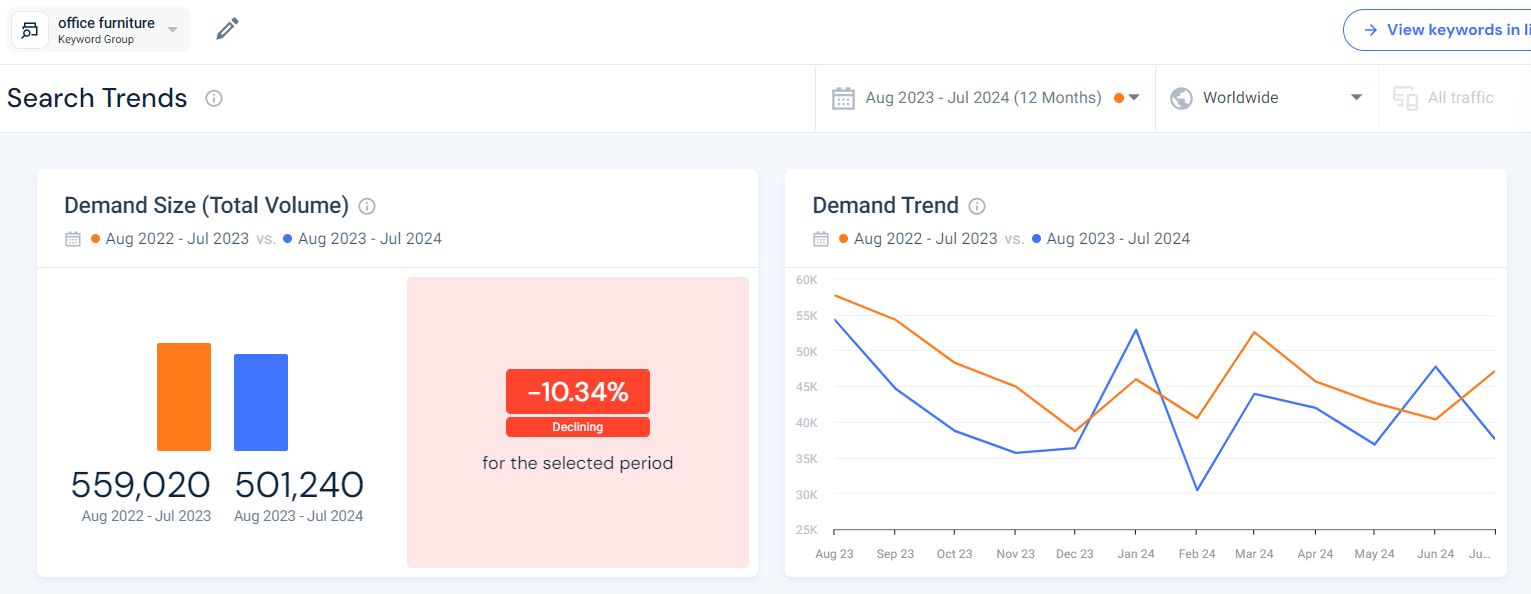
Market research may also reveal long-term trends, which further govern strategic decisions. As an example, the growing preference for online shopping has been building for years and those firms that invested in e-commerce are better equipped to fulfill consumer demand in the future.
8. Reduce business risks
Any business venture carries inherent risks, but with market research, this can be mitigated. When you have insights into market conditions, customer expectations, and challenges, this research will allow you to make more informed decisions, significantly reducing the likelihood of costly failures and ensuring steady business growth. One good example is market validation , which checks the feasibility of new products before launching them so you can save not just on time, but also resources.
With market segmentation analysis, the risks can be significantly reduced. Being able to recognize different market segments allows you to tailor your products and marketing tactics to align them with specific needs, and this could increase the odds of successfully penetrating the market. For instance, a beverage company might identify a niche for low-sugar drinks and decide to launch a new product line that will target health-conscious consumers.
Another strategy that you should consider is testing your product concepts before launching them on a full scale. By concept testing via focus groups or market research surveys , you’ll be able to get early feedback on which products have real potential so you can do refinements with your offerings.
More specifically, market research can be a useful tool for risk assessment should your business decide to expand internationally. Deep research on local regulations, cultural preferences, and the competitive landscape will help your company devise a strategy that minimizes the risks and maximizes the opportunities.
9. Uncover opportunities for growth
From new market segments to untapped customer needs, the expansion opportunities are numerous. Research helps in getting a better understanding of the market so you can find these opportunities. Analysis will help spot trends, and data analysis lends support to expansion which can drive growth and long-term sustainability.
With periodic market research, you can identify growth trends in related industries. For example, a company selling products online can use Similarweb’s Market Analysis and realize there’s increased traffic to marketplace websites in a specific locale and decide to start focusing their marketing efforts towards it.
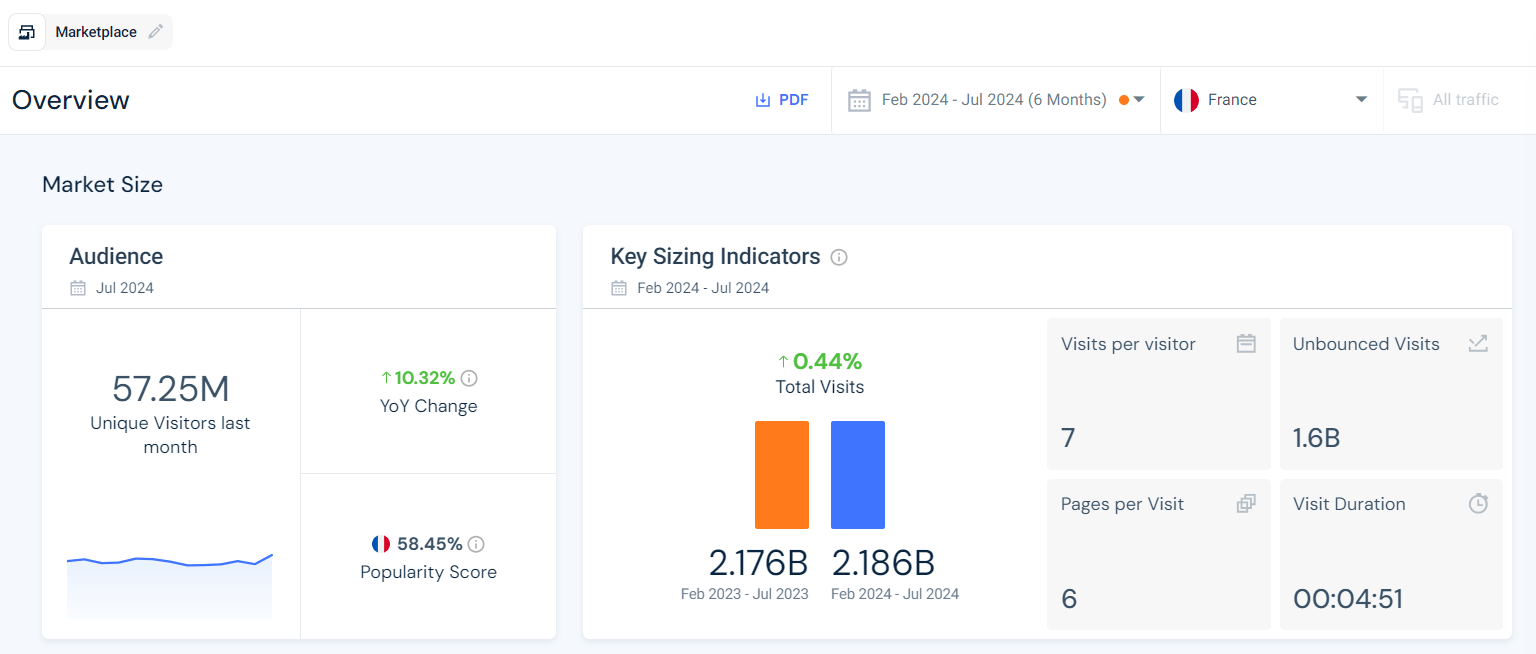
Another dimension of growth involves identifying underserved segments. Market research enables the recognition of these segments, allowing for the creation of strategies to target them effectively. For example, an outdoor gear company could gain popularity among city dwellers, leading to the development of products specifically designed for short urban getaways.
Strategic partnerships can also be a significant driver of growth. Collaborating with businesses that share the same audience allows for joint campaigns or co-branded products, expanding your reach. These opportunities enable both businesses to evolve and better serve their customers’ changing needs, fostering long-term success.
The path to success starts with research
Understanding the importance of market research is key because it is an extremely powerful tool that furnishes data and insight needed for making sound decisions, gaining a competitive edge, and experiencing growth. The value it brings cuts across virtually all dimensions of business, from the identification of new products to risk reduction and optimization of marketing. Knowing why market research is necessary makes it easy to understand its multifaceted significance in various business strategies.
Market research tools like Similarweb provide valuable insights to maximize your digital marketing efforts. Our platform offers the tools and insights you need to craft and make data-driven decisions and marketing strategies that give you a competitive edge.
Ready to win your market?
Get the data and insights you need to beat the competition
What are the different methods of market research?
Techniques in market research include both quantitative and qualitative measures. The qualitative means, which include focus groups and in-depth interviews, are time-consuming yet very effective in revealing the feelings and behaviors of customers. Quantitative measures, however, include questionnaires and data analyses that provide numerical insights and can be statistically analyzed.
How does market research help in launching a product?
Market research will help to validate a product concept, identify the target market, and define optimal price and marketing strategies before launch. Research conducted after the launch of a product will yield information about the satisfaction of customers and areas that need improvement.
Why is competitor analysis an important component of market research?
Competitor analysis will give an overview of the competitive landscape and the competitors’ strengths and weaknesses while uncovering hidden potential market opportunities. Understanding these will allow you to frame strategies that differentiate your offerings from the competition and secure your market share.
What role does market research play in customer segmentation?
Customer segmentation divides a market into different groups that have distinct needs or even different characteristics. Market research provides data for the identification of these segments and this enables a business to ‘tailor’ its products, services, and marketing efforts to the needs of each group.
Can market research predict future trends in consumer behavior?
Even though this is not an absolute forecast of the future, market research does give insight into emerging trends and changes in consumer behavior. This information helps a business adapt and be relevant at times when the markets are changing.

by Monique Ellis
Content Marketing Manager
Monique, with 7 years in data storytelling, enjoys crafting content and exploring new places. She’s also a fan of historical fiction.
Related Posts

Audience Segmentation: Definition, Importance & Types

Geographic Segmentation: Definition, Pros & Cons, Examples, and More

Demographic Segmentation: The Key To Transforming Your Marketing Strategy

Unlocking Consumer Behavior: What Makes Your Customers Tick?

Customer Segmentation: Expert Tips on Understanding Your Audience

Market Demand 101: How to Gauge Demand for Your Products
Wondering what similarweb can do for your business.
Give it a try or talk to our insights team — don’t worry, it’s free!
Why Is Market Research Important: We Give You 7 Reasons

Planning and conducting market research is a critical component of any business. It provides decision-makers with important information to decide the course of the company, launch a new product, or to keep a tab on what competitors are doing.
Data indicates that market research is a growing industry of 47.36bn USD , globally – and rightly so. For a business to succeed, all its resources – financial and otherwise – must be invested in areas where they are needed the most. Conducting market research helps you identify those areas. It also helps you discover and understand your customers’ needs so you can innovate better, expand when the time is right, and work with more focus.
In this article below, we will share a few pointers with you about why market research is important for every business – big and small. But first, let’s talk about the types of market research.
Types Of Market Research
Depending on the purpose of your research, you can choose either of the two main types of market research. These are primary research and secondary research.
– Primary Research
Primary research is direct research that you conduct yourself or hire someone else to do it for you. It involves reaching out to your target market, asking them questions, collecting data, and analyzing the information gathered. Based on the data, strategies are devised, decisions are made, and policies are created.
Primary research helps you explore issues, dig deeper, and ask specific questions that are relevant to research topics or what you are looking for. Because it takes more time and effort, it may also cost a bit more than secondary research but it is more effective and helps you gain a solid picture of what’s going on.
– Secondary Research
Secondary research is using somebody else’s primary research for your business purposes. Research that is already conducted, organized, and published is often used by small businesses to gauge market trends, current economies, and to devise plans.
A lot of government agencies conduct market research for various purposes. If you’re on a budget, going to one of those agencies may help you out a lot as most of that research is freely available to the public. If you want to access a private market research company’s report, you may have to pay a fee to access the complete file.
However, there are private companies that publish their reports publicly. Additionally, you can also go online and conduct Google searches looking for specific phrases relevant to your research purpose to find valuable data.
Why Is It Important?
Now that we know what market research is and what different kinds it has, it’s time to learn why it is important, and why you should invest in it if you want to become a successful entrepreneur.
1. It Helps You Identify The Problem Areas As Well As Strong Areas
Knowing what you are good at and what you’re not, help you take profitable risks in life. It’s true in business too. Accurate market research helps you identify business areas that are performing well, those that need more attention, and also those that you should perhaps give up.
Back in 2010 , two young tech enthusiasts launched a location-based app – Burbn – that would allow consumers to check-in, make plans of hangouts with friends, share pictures, and more. Few weeks into the launch, they realized through internal discussions and reevaluation of the market, that Burbn is cluttered and their target market is more into Foursquare and they won’t be able to budge them.
They took a long, hard look at their app again – which had already been launched – and started working on it from scratch, removing all the features and only letting the photo-sharing, liking, and commenting options intact. And thus, Instagram was born.
It also helps you discover and understand your customers’ needs so you can innovate better, expand when the time is right, and work with more focus. For example, if you plan on starting a digital marketing agency, you’d know that there’s more need for social media in your area, than for PPC services. Thus, you’ll hire more social media experts.
2. It Helps You Understand Your Customers’ Needs
It is not enough that you know your business; you got to know what your customers are saying about you – and about your competitors. If you have got your pulse on what your customer is thinking, you’d create products that solve their issues, reach out to them when they are most ready to listen, and help them become your loyal ambassadors.
A huge part of business market research is always dedicated to gauging customer satisfaction rates, their reactions to a new product, and what they are looking for next.
In 2005, when YouTube initially launched, it was for a very different purpose : dating. Pretty soon into launch, however, and by investing in robust market research (a part of which they conducted themselves) the founders realized that their video dating app is not what their customers are looking for. Analyzing the data, they discovered that there is no app or platform in the market for video sharing. The websites that were offering this service were patchy at best and not intuitive at all.
Being attuned to their customers’ needs and spotting a wide space in the market, they tweaked their video platform and launched YouTube .
Following what your customers are talking about, listening to them, and then delivering on their needs is an important task that you can fulfill with timely customer-centered market research.
3. Helps You Conduct Your Marketing Based On Informed Decisions
Launching and running a business means making decisions every day – about products, services, expansions, HR, and so much more. Without solid market research backing your decisions, all you are doing is guess-work, hoping the results will be in your favor.
With research helping your business, you are better informed about areas to invest in, gauge the potential success of new products, test new markets to expand into, and to determine what kinds of products/services will be most favored by your customers.
This is certainly what Starbucks does. The company has a whole dedicated platform ‘My Starbucks Idea’ where employees and customers and anyone who wants can pitch in and share what they think the company should do next, the flavors it should try, the new products it should launch, bring back some old favorites, and more.
The platform helps them remain informed on all important aspects of business investment and propels them towards ventures and venues that hold the most potential.
If you aren’t a humungous company like Starbucks and cannot afford to host dedicated platforms to gain important information, invest in market research whenever you have a big decision coming up. It isn’t as expensive as you think and doesn’t take that much time. Plus the results can be relevant for a lot of related areas that you may want information on.
4. Helps You Keep An Eye On Your Competitors
As a startup founder, you may think being original is all about being focused on what you’re doing and not worry about what everyone else may be up to. This approach spells long-term disaster. While you should certainly keep your focus on your own efforts, it is critical – and smart – to keep tabs on your rivals and know what they are thinking or planning.
With sound market research on your side, you can better prepare for what your competitor may be about to do next and make sure they aren’t able to put a dent in your market share. With regular research, you can not only learn to anticipate their next move but be in a better position to avert any possible damage from their end.
In addition to conducting market research, you can pair it up with regularly monitoring their social media or to increase Instagram followers , blog posts, and seeing what is trending in your market. Here is a great resource on how you can go about it.
5. Helps You Expand And Innovate
Market research can help you identify markets and geographical areas where you can expand to. It can also help you to invest in ideas that have the most potential to succeed based on what customers are looking for and what the market is lacking.
For example, if you are a retail company, conducting market research can help you identify locations where your store can profit the most. If you are planning to buy a business to increase your market share, market research can help you point towards businesses that may be ripe for acquiring. Not only that, conducting market research before you launch your business can help you figure out ways to put your best foot forward.
It guides you towards opportunities where you have the most room to innovate and take risks with the highest return potential. For example, if your competition is employing cutting edge tech such as VoIP Phone to get better results, you can also employ the same to improve your customer care and business goals.
6. Helps You Set Business Goals
Goal-setting is one of the major parts of running a business – big and small. Goals give you directions, help you remain in sight of the bigger picture, and set you on the path of continued success. Goals can be of different kinds: short-term, long-term, department-oriented, over-arching, and such.
To set all these kinds of goals and get ready to meet them, businesses need to have a thorough and complete knowledge of their strengths and weaknesses. They need to be aware of how the market is behaving and predict what may come next.
All of this is only possible after conducting market research. With the help of focused market research, you can set achievable business goals and not follow some vague notions of instant success. These often include how to improve productivity, customer satisfaction, and business’ financial health. You can also use market research to learn ways you can reduce expenses without hurting the business, find out how to amplify your digital marketing, generate copywriting tips for research paper writers , or introduce a new employee incentive program.
7. Helps You Know Which Risks To Take And Increases Earning Potential
Risk-taking is an important component of the business. Without it, you can become stagnant and a sitting-duck for a more ambitious rival. But risk-taking cannot be a shot in the dark. To know which risks to take and when to take the plunge are attributes of successful innovators. From Dropbox’s Drew Houston who refused Steve Jobs to Google’s buying of YouTube when it was a fledgling startup, the history of business success and innovating is packed full of stories of ambitious – but informed – risk-taking.
Using market research and building a strong investing network , you can also join the ranks of informed-decision makers who do not shy away from taking risks. It prevents you from making costly mistakes that could have been avoided and take steps that result in massive profits.
Take the example of Frito-Lay . When the potato chip maker wanted to introduce a new brand, it launched online market research conducted through Facebook to ask its customer-base which flavor they would like the best. The results showed that beer-battered onion-ring flavor is a hit in California and Ohio, while New Yorkers preferred the Churros flavor idea. This research also helped him increase Instagram followers as his posts became popular over the internet.
The research helped the company come up with different flavors and market them strategically to different states. If the research would not have been done, the company would have come up with a new flavor that could have been a hit – or a miss.
Popular Instruments Of Market Research
As technology keeps advancing, market research keeps evolving. Where before you had to rely on face-to-face interviews, telephone surveys, or lengthy online questionnaires, now it’s all about short online surveys, online video interviewing tools , instant case studies aided by technologies, and focused groups that are already available on your social media channels.
Below we talk about 4 popular instruments of market research that are frequently used by companies worldwide with excellent results.
– Surveys
The survey is a quantitative method of research which means it gives you numerical scores. These scores pertain to specific answers and don’t leave much room for multiple interpretations. Because they are precise, provide specific answers, and immediate interpretation, quantitative methods are popular to conduct research when you are looking for exact information: to find out how to solve a particular problem, etc.
According to a study conducted by Statista.com , 26% of all market research is conducted through online quantitative methods, with online surveys accounting for a major share of 79%.
If you know how to create an easy survey online for your company, here is a great resource to get you started.
– Case Studies
Case studies are usually qualitative research methods; however, you can incorporate a mixed approach with a quantitative questionnaire thrown in for additional information. Using case studies, you focus on a single individual or single entity to research them thoroughly. The purpose of using case studies in business market research is usually to test theories of what went wrong in a particular situation or what went right.
Case studies are time-taking but provide extremely valuable information, detailed data, and in-depth analysis opportunities.
– Focus Groups
Focus groups are another popular instrument to conduct market research in business. A focus group consists of a small portion of your target audience that you can study in detail. It is a qualitative method of research and allows you to bring together a group of individuals that can take part in a guided form of discussion.
You can give them one or more focus questions that the group can talk about and share their views on. Focus groups are great to use when you’re creating a new product, researching a particular market segment, or want to know what your customers are thinking about you or your market.
Similar to case studies, focus groups give you a comprehensive view of a situation and allow you to conduct an in-depth analysis of different business elements.

The Future Of Market Research
The future of market research is bright. As a budding and burgeoning industry, it shows all the trends of continued growth. But as technology becomes more accessible and mobile devices more popular than desktops, market research is also evolving to fulfill the shifting customer needs.
The surveys are becoming shorter as nobody has got the time or interest to fill out a 10-page questionnaire. Artificial Intelligence is making the data collection process quicker and more intuitive, including contact database . And as time passes, you’ll see more and more market surveys being optimized for mobile.
So use all that modern market research has to offer you and use it to propel your business for the success you’d always dreamed of.
Embed this Infographic on your site using the html below:
<br /><a href="https://www.surveycrest.com/blog/why-market-research-is-important/"><br /><img src="https://www.surveycrest.com/blog/wp-content/uploads/2020/06/Market-Research-Trends.png" title="[INFOGRAPHIC] Why Is Market Research Important: We Give You 7 Reasons" alt="[INFOGRAPHIC] Why Is Market Research Important: We Give You 7 Reasons" border="0" /><br /></a></p> by <a href="https://www.surveycrest.com/">Surveycrest.com</a><br />
« Re-Imagine Marketing Strategy To Ensure Your Business Thrives Even In The Lockdown
Why mental health surveys are important during the covid-19 pandemic ».
About The Author Kelvin Stiles
Kelvin Stiles is a tech enthusiast and works as a marketing consultant at SurveyCrest – FREE online survey software and publishing tools for academic and business use. He is also an avid blogger and a comic book fanatic.
- How it Works
- Survey Templates
- Terms and Conditions
- Privacy Policy
Copyright © 2024 SurveyCrest.com
Don't have an account? Register Here
Already have an account? Sign in Here
Forgot Password
To reset your password please enter username or email below and press reset button.
OR login using a social network account
- --> Login with Facebook
- Login with Facebook
- --> Sign in with Google

Why is Market Research so Important?

Before you find out the importance of market research, it’s necessary to understand what market research is. It is the process of gathering data, analyzing it, and then interpreting the result to solve issues and challenges that you face in marketing. When you perform market research, you can make an informed decision be it to launch a new product or develop a marketing strategy. The research helps you understand the needs of your target audience and packaging your marketing messages based on them. Market research is not a one-off endeavor; it should be an ongoing process so that at any given point, you have valuable information about your customers, their needs, and their preferences as well as the marketplace. Remember, a business environment is never static and understanding the factors that affect your marketing strategies is market research.
Market Research: The Types There are several types of research that you can conduct to gain better insights. Some of the most common types are as follows:
Researching a brand Testing usability Researching competition Researching target consumers Researching the effectiveness of a marketing campaign Researching customer segmentation
These are the different types of research and each type can be further broken down into primary and secondary research.
In the primary research, the focus is on collecting data that is completely fresh and has never been collected before. On the other hand, secondary research refers to collating already available data and organizing and analyzing it to meet your business needs.
Different research methods are utilized to collect and analyze different types of data, and as a result, there are different methodologies for data collection. The data collection can be qualitative or quantitative, depending on your requirements.
Importance of Market Research Whether you are starting a new business or operate an existing business, market research is an invaluable tool. It helps you understand your target customer and your competition. In a globalized world, catering to customers from different cultures has become the norm. Market research enables you to understand the cultural and language differences and cater according to the needs of your target audience in a specific geographical region.
Market research enables a business to understand risks when it is entering a new market or launch a new product. That way, when they take key business decisions, decision-makers can minimize risks. This lays the foundation for a successful marketing campaign, depending on your goals.
In short, market research helps a business understand its target audience, who and why they buying a product or service, what motivates them to buy a product or service, and what makes consumers loyal to a brand. Armed with this information, you can tailor your marketing message to make your brand, product, or service more attractive, and in the long run, it helps to increase sales.
Market research also enables you to pinpoint new opportunities. It helps you understand the prevailing and future trends and how you can offer your services or products based on the changing market scenarios and consumer preferences.
The Bottom Line Market research is the mainstay of any marketing strategy. It gives you in-depth insights into the marketplace (including your competition) and your target consumers so that you can meet their expectations. The findings from good market research enable decision-makers to make important decisions that benefit the business and increase sales and revenue. Hence, you cannot disregard the importance of market research to your marketing strategy.
About the Author
Himanshu vashishtha administrator.
Why is market research important? Here are 7 reasons

Doing your own market research on a regular basis is essential for keeping up with current market trends and maintaining a competitive edge. Whether you are starting a new business, expanding, or developing new products, conducting market research is essential. It helps you to understand your target market, increase sales, and spearhead business growth. In this article, we share 7 reasons why you should be investing in market research .
Use Netigate to send your market research surveys .
1. Identify new customers
In order to identify potential new customers, you must first understand who your customers are. You will also need to know key demographics.
When looking at your product or service, it’s important to consider questions such as:
- Who will use your product or service?
- What is the age range of your customers?
- What is their income level, marital status, and geographical location?
Using market research to understand these factors will enable you to target customers more effectively.
- Create surveys based on our templates
- Send surveys via email, links, API or individual logins
- Analyse responses with filters & AI
2. Get to know your existing customers
Similar to the above point, you should also take the time to understand who your existing customers are. Here are some questions to ask:
- Why do your customers choose your products over your competition?
- How do your customers use your products?
- How do your products solve a challenge?
- Who or what influences their purchase decisions?
- What do your customers enjoy doing, watching, and reading?
Understanding how your existing customers use your products as well as what challenges your products solve will help businesses improve their products as well as identify upsell opportunities with existing customers.
3. Set realistic targets for your business
Now that you are armed with information about your target customers and existing customers, you can use this data to set achievable and realistic goals for continuous improvement and business growth.
Being customer-centric in your approach is essential in today’s business climate. The most common approach in market research is to use an STP model: Segmentation – Targeting – Positioning.
Segmentation : Who will your product appeal to in terms of demographic, location, or other factors?
Targeting : How can you target and reach those sectors that your products appeal to?
Positioning : How can you position yourself in front of your competitors as your target market’s choice?
4. Develop new and effective strategies
Data from market research will help you to make more informed decisions. For example, relating to pricing, distribution channels, marketing mediums, or to identify opportunities to introduce a new product or service. These results will also help you to make more informed decisions about your existing operations and activities.
- Should you expand or reduce?
- Is there room in your current operations to diversify?
- Are you targeting the right audience with your marketing activities
Casio used market research to get better insights on customers & resellers and adjusted the marketing strategies to be more effective.

5. Solve your biggest business challenges
If you have already identified a problem in your business, conducting market research will help you determine the source of the issue. For example, you can determine if a new competitor has entered the market or if brand awareness has fallen short, causing a decrease in sales. There are several types of market research that can help you identify different shortcomings: brand research, consumer research, product development and usability testing, consumer research, and many other areas.
Get started with our free market research survey templates.
6. Investigate expansion opportunities
Market research helps you identify areas for possible business expansion. Given that it offers the opportunity to test markets to determine if there is room for a new product or service. You can also conduct market research to find the best location to open a new store.
7. Identify how to expand your offering
Market research may help you discover new markets that are under-serviced or in demand. For example, you can identify changing market trends due to new housing construction, increased levels of education, or other changes that will bring new opportunities for your business.
All in all, market research isn’t just for new startup businesses. Businesses of all shapes, sizes, scope, industry and experience levels can benefit from market research. Market research can help you to learn about new and existing customers, identify issues and solve problems, and even help explore new opportunities that pave the way for business growth.

How to use feedback software in event planning
Learn how survey software can be used as a tool for helping you in your event planning.

Your guide to conducting a website feedback survey
This article summarises everything you need to know about website feedback surveys and helps you to implement them step-by-step on your webpage.

Your guide to panel research – what you need to know
This article explores panel research and how it works within market research. Market research is…
Sign up to our monthly newsletter and get the latest insights
By submitting the form, you agree to Netigate's terms and conditions and order processing agreement and acknowledge that you have read Netigate's privacy policy .
✅ Get the latest insights, reports, and eBooks ✅ See feedback management tips and best practices ✅ Be the first to hear about platform enhancements and features
Almost there!
Please confirm your email address by clicking the link in the email we just sent you.
Quick start guide to Text Analysis

But first, cookies 🍪
Privacy overview.
| Cookie | Duration | Description |
|---|---|---|
| cookielawinfo-checkbox-advertisement | 2 years | Records if the user has consented with marketing cookies |
| cookielawinfo-checkbox-analytics | 2 years | Records if the user has consented with analytics cookies |
| cookielawinfo-checkbox-functional | 2 years | Records if the user has consented with functional cookies |
| cookielawinfo-checkbox-necessary | 2 years | Records if the user has consented with necessary cookies |
| CookieLawInfoConsent | 2 years | Records the default button state of the corresponding category & the status of CCPA. It works only in coordination with the primary cookie. |
| viewed_cookie_policy | 2 years | To record if a cookie message box has been shown. |
| Cookie | Duration | Description |
|---|---|---|
| lpv294052 | session | This LPV cookie is set to keep Pardot from tracking multiple page views on a single asset over a 30-minute session. For example, if a visitor reloads a landing page several times over a 30-minute period, this cookie keeps each reload from being tracked as a page view. |
| visitor_id# [x2] | 14 months | Unique visitor id related to Pardot account |
| visitor_id#-hash [x3] | 14 months | Saves visitor id as a hash |
| Cookie | Duration | Description |
|---|---|---|
| _ga | 14 months | The _ga cookie, installed by Google Analytics, calculates visitor, session and campaign data and also keeps track of site usage for the site's analytics report. The cookie stores information anonymously and assigns a randomly generated number to recognize unique visitors. |
| _gid | 1 day | Installed by Google Analytics, _gid cookie stores information on how visitors use a website, while also creating an analytics report of the website's performance. Some of the data that are collected include the number of visitors, their source, and the pages they visit anonymously. |
| AnalyticsSyncHistory | 1 month | Used to store information about the time a sync with the lms_analytics cookie took place for users in the Designated Countries |
| Cookie | Duration | Description |
|---|---|---|
| _fbp | 3 months | This cookie is set by Facebook to display advertisements when either on Facebook or on a digital platform powered by Facebook advertising, after visiting the website. |
| _gcl_au | 3 months | Provided by Google Tag Manager to experiment advertisement efficiency of websites using their services. |
| _uetsid | 1 day | Stores and tracks visitors across websites |
| 1P_JAR, CONSENT, NID | 2 years | Collects site statistics and tracks conversion rate |
| bcookie | 2 years | LinkedIn sets this cookie from LinkedIn share buttons and ad tags to recognize browser ID. |
| bscookie | 2 years | This cookie is a browser ID cookie set by Linked share Buttons and ad tags. |
| lang | session | LinkedIn sets this cookie to remember a user's language setting. |
| lidc | 1 day | LinkedIn sets the lidc cookie to facilitate data center selection. |
| MUID | 1 year 24 days | Bing sets this cookie to recognize unique web browsers visiting Microsoft sites. This cookie is used for advertising, site analytics, and other operations. |
| UserMatchHistory | 1 month | Linkedin - Used to track visitors on multiple websites, in order to present relevant advertisement based on the visitor's preferences. |

Why Is Market Research Important?
Navigating the ever-shifting sands of today’s business world without the right insights is akin to setting sail without a compass. The volatile dynamics of modern markets present a labyrinth of challenges and opportunities that can make or break a company’s trajectory. At the heart of navigating this complexity with accuracy and foresight is the question: Why Is Market Research Important?
Market research stands as the critical compass for businesses, guiding them through uncharted territories with vital insights into market trends, customer preferences, and competitive landscapes. It’s the indispensable backbone of strategic planning, shining a light on the path forward and revealing the intricacies that might otherwise be missed.
Table of Contents
The Foundation of Informed Decision Making
Market research provides a solid base for making informed decisions. By collecting and analyzing data on consumer behavior, businesses can identify potential opportunities and threats within the market. This process enables companies to tailor their strategies effectively, ensuring that their decisions are backed by solid evidence rather than mere speculation.
Moreover, in a world where consumer preferences are constantly shifting, staying updated with the latest trends is imperative. Market research offers a window into the future, predicting changes in consumer behavior and helping businesses stay ahead of the curve.
Leveraging Data for Strategic Insights
The first step in making informed decisions is gathering data. But not just any data—the focus should be on high-quality, relevant data that directly impacts your business’s strategic goals. Market research facilitates this by collecting data from a variety of sources, including customer surveys, social media analytics, industry reports, and competitor analysis. This data, when analyzed correctly, reveals patterns, trends, and insights that are invaluable for strategic planning.
For example, a company looking to enter a new market can use market research to assess the market’s size, competition level, and potential customer base. This information becomes the bedrock upon which all further strategic decisions are based, significantly reducing the risk associated with market entry.
Turning Insights into Action
However, collecting and analyzing data is just one part of the equation. The true power of market research lies in its ability to turn insights into actionable strategies. This requires a deep understanding of both the data and the business’s strategic objectives. By aligning the insights gained from market research with these objectives, businesses can create detailed action plans that are both ambitious and achievable.
This process also involves identifying key performance indicators (KPIs) that will help measure the effectiveness of these strategies over time. By continuously monitoring these KPIs and adjusting strategies as needed, businesses can stay aligned with their goals and adapt to changing market conditions.
Enhancing Customer Centricity
At the heart of informed decision-making is an unwavering focus on the customer. Market research provides a window into the customer’s mind, offering insights into their needs, preferences, and pain points. This customer-centric approach ensures that decisions are not just informed by data, but are also deeply aligned with the needs of the target audience.
By placing the customer at the center of strategic planning, businesses can develop products, services, and marketing messages that resonate more deeply with their audience. This not only enhances customer satisfaction and loyalty but also drives long-term business growth.
The Role of Technology in Informed Decision Making
In the digital age, technology plays a crucial role in enhancing the decision-making process. Advanced analytics tools, artificial intelligence, and machine learning algorithms can process vast amounts of data at unprecedented speeds, uncovering insights that would be impossible for humans to detect. This technological advantage allows businesses to make more accurate predictions about future trends and make decisions that are informed by a comprehensive analysis of the market.
Crafting Tailored Customer Experiences
Understanding the specific needs and wants of your target audience is paramount. Market research sheds light on customer preferences, allowing businesses to craft personalized experiences that resonate with their audience. This not only enhances customer satisfaction but also fosters loyalty and long-term engagement.
In addition, feedback gathered through market research can highlight areas for improvement, enabling businesses to refine their offerings and exceed customer expectations continually.
Understanding the Customer Journey
The foundation of crafting tailored experiences is a thorough understanding of the customer journey. Market research helps businesses map out each stage of this journey, from initial awareness to post-purchase. By identifying key touchpoints, companies can pinpoint opportunities for personalization that can significantly enhance the customer experience.
For instance, data gathered through customer feedback surveys can reveal pain points in the purchasing process. Addressing these issues can not only improve the overall experience but also increase conversion rates and customer retention. Similarly, analyzing browsing and purchase history can enable businesses to offer personalized product recommendations, creating a more engaging and relevant shopping experience.
Leveraging Segmentation for Personalization
Customer segmentation is another area where market research adds immense value. By dividing the customer base into distinct segments based on demographics, behaviors, or preferences, businesses can tailor their messaging and offerings to better meet the needs of each group.
This level of personalization not only improves the effectiveness of marketing campaigns but also strengthens the emotional connection between the brand and its customers. For example, a company can use segmentation to send targeted email campaigns that offer exclusive deals on products that a particular group has shown interest in. This not only increases the likelihood of conversion but also conveys a sense of understanding and care, enhancing customer loyalty.
Enhancing Customer Interactions through Feedback
Continuous improvement is crucial in maintaining and enhancing customer experiences. Market research facilitates this by providing a mechanism for collecting and analyzing customer feedback. This feedback is invaluable for understanding how customers perceive their interactions with the brand and identifying areas for improvement.
Engaging with customers through surveys, social media, and review platforms not only offers insights into their experiences but also makes them feel valued and heard. This engagement can foster a positive relationship between the customer and the brand, encouraging repeat business and referrals.
The Role of Technology in Personalization
Advancements in technology have greatly expanded the possibilities for personalized customer experiences. Artificial intelligence and machine learning can analyze customer data at scale, predicting future behaviors and preferences with a high degree of accuracy. This enables businesses to anticipate customer needs and offer personalized experiences proactively.
For instance, AI-powered chatbots can provide instant, personalized customer support, guiding customers through their journey in a conversational manner. Similarly, machine learning algorithms can optimize website and app interfaces for individual users, displaying content and offers that are most relevant to their interests.
Navigating the Competitive Landscape
In today’s highly competitive business environment, staying informed about your competitors is key. Market research helps businesses understand their competitors’ strategies, strengths, and weaknesses. This knowledge is invaluable for carving out a unique position in the market and differentiating your offerings from those of your competitors.
Furthermore, it enables companies to anticipate competitive moves and react proactively, ensuring they remain competitive and relevant in the market.
The competitive landscape in most industries is more dynamic than ever, with new players entering the market and established ones continuously innovating. In this context, market research is not just helpful; it’s essential. It provides a detailed overview of the competitive environment, enabling businesses to make strategic moves with confidence.
Identifying Competitor Strengths and Weaknesses
One of the first steps in navigating the competitive landscape is to understand your competitors’ strengths and weaknesses. Market research helps in gathering this intelligence by analyzing competitors’ product offerings, market position, customer reviews, and marketing strategies. This analysis can uncover gaps in their offerings or areas where your business can differentiate itself.
For instance, if a competitor excels in product quality but falls short in customer service, your business can capitalize on this by emphasizing superior customer support. By positioning your brand as not just a provider of quality products but also as a leader in customer satisfaction, you can create a unique selling proposition that sets you apart.
Monitoring Market Trends and Innovations
Staying abreast of market trends and innovations is critical for maintaining a competitive edge. Market research plays a vital role in this, offering insights into emerging trends, customer preferences, and technological advancements. This ongoing analysis ensures that businesses are not caught off-guard by new developments and can adapt their strategies accordingly.
For example, a company that keeps track of emerging technologies can quickly incorporate these into their offerings, delivering cutting-edge products or services to their customers. Similarly, understanding shifts in consumer preferences can help businesses pivot their marketing strategies to align with these new demands, ensuring they remain relevant and competitive.
Anticipating Competitor Moves
Effective market research also involves predicting your competitors’ next moves. This requires a combination of competitive analysis, understanding of market trends, and deep knowledge of the industry. By anticipating these moves, businesses can prepare their responses in advance, whether it’s through innovation, marketing campaigns, or strategic partnerships.
This proactive approach can give businesses a significant advantage, allowing them to stay one step ahead of the competition. It also demonstrates to customers that the company is a leader in the industry, always ready to meet their needs and exceed their expectations.
Leveraging Competitive Intelligence for Strategic Planning
The insights gained from navigating the competitive landscape are invaluable for strategic planning. They enable businesses to make informed decisions about product development, marketing, and expansion strategies. By understanding the competitive environment, companies can identify opportunities for growth and areas where they need to improve to maintain their market position.
Moreover, competitive intelligence can help in resource allocation, ensuring that investments are made in areas that will yield the highest return. Whether it’s enhancing product features, entering new markets, or ramping up marketing efforts, strategic planning guided by market research ensures that resources are used effectively to achieve business goals.

Innovating with Confidence
One of the strongest pillars of sustained business growth is innovation. Market research plays a critical role in the innovation process by identifying gaps in the market and uncovering emerging trends. This insight is crucial for developing new products or services that meet the evolving needs of consumers.
Additionally, market research can validate ideas before significant investments are made, reducing the risk associated with innovation and ensuring that resources are allocated efficiently.
Risk Management and Investment Efficiency
Investing resources wisely is crucial for any business aiming for growth. Market research aids in identifying areas with the highest potential for return on investment, ensuring that resources are channeled into ventures that are most likely to succeed.
It also serves as a tool for risk management by highlighting potential pitfalls and enabling businesses to devise strategies to mitigate these risks.
Tailoring Marketing Strategies for Maximum Impact
Effective marketing is not about casting the widest net but targeting the right audience with precision. Market research provides detailed insights into the demographics, preferences, and behaviors of your target audience, enabling businesses to tailor their marketing strategies for maximum impact.
This targeted approach not only optimizes marketing budgets but also significantly increases the effectiveness of marketing campaigns.
A Deep Dive into the Importance of Market Research
In the complex tapestry of the modern business environment, navigating the competitive landscape requires more than just a good product or service; it demands a deep understanding of market dynamics, consumer behavior, and competitive strategies. This is where market research comes into play, serving as a lighthouse guiding businesses through competitive waters.
Unveiling Market Trends and Opportunities
The first layer of this deep dive into market research revolves around its ability to unveil emerging trends and untapped opportunities. By systematically analyzing market data, businesses can spot patterns that indicate shifting consumer preferences or emerging market needs. This foresight allows businesses to adapt their offerings and strategies proactively, ensuring they stay relevant and competitive.
For instance, market research might reveal a growing demand for sustainable products within a certain demographic. Armed with this insight, a business can pivot its product development and marketing strategies to cater to this demand, positioning itself as a leader in sustainability within its industry.
Understanding Competitive Dynamics
Another crucial aspect of navigating the competitive landscape is understanding not just who your competitors are but how they operate, their strengths, weaknesses, and strategic focus. Market research facilitates a deep dive into these competitive dynamics, offering insights that can inform strategic decisions such as product positioning, pricing strategies, and marketing messages.
Competitive analysis, a key component of market research, involves evaluating competitors’ products, sales tactics, and customer service approaches. This analysis can reveal gaps in the market that a business can exploit or areas where it needs to improve to maintain its competitive edge.
Crafting Differentiated Value Propositions
In a market crowded with similar offerings, differentiation becomes key to attracting and retaining customers. Market research helps businesses craft unique value propositions that resonate with their target audience. By understanding the specific needs, preferences, and pain points of their customers, businesses can tailor their products, services, and messaging to meet these needs more effectively than their competitors.
This level of differentiation is not just about being different; it’s about being relevantly different in ways that matter to the customer. Market research ensures that differentiation strategies are grounded in real customer insights, making them more likely to succeed.
Fostering Innovation and Growth
Lastly, market research is instrumental in fostering innovation and driving growth. By identifying new market segments, uncovering customer needs, and anticipating future trends, market research provides a solid foundation for innovation. It enables businesses to take calculated risks, develop new products, and enter new markets with confidence.
Moreover, continuous market research ensures that businesses remain agile, able to adapt to market changes quickly, and seize opportunities as they arise. This agility is critical for sustained growth and competitiveness in today’s fast-paced business environment.
Final Notes: Why Is Market Research Important
In wrapping up our exploration of the vital role of market research, it’s clear that its impact extends far beyond mere data collection. It is the foundation upon which successful businesses build their strategies, innovate, and connect with their customers on a deeper level. BigMarketDigital thanks you for joining us on this insightful journey into the heart of market research. May your business always be guided by the rich insights and strategic foresight that only well-conducted market research can provide.
Similar Posts

How To Handle Competition In Business
Share This Article Share on Facebook Share on Twitter Share on LinkedIn Share on Pinterest Share on Reddit Share via Email In an era where data reigns supreme, strategic market research has emerged…

Why Is Competition Good For Businesses
Share This Article Share on Facebook Share on Twitter Share on LinkedIn Share on Pinterest Share on Reddit Share via Email In the bustling world of business, competition stands as a driving force…

What Is Competitor Analysis
Share This Article Share on Facebook Share on Twitter Share on LinkedIn Share on Pinterest Share on Reddit Share via Email Navigating the complexities of the modern market without a clear understanding of…

What Is Secondary Market Research?
Share This Article Share on Facebook Share on Twitter Share on LinkedIn Share on Pinterest Share on Reddit Share via Email Have you ever wondered how businesses seem to hit the nail on…

How To Do Market Research For A Startup
Share This Article Share on Facebook Share on Twitter Share on LinkedIn Share on Pinterest Share on Reddit Share via Email Navigating the murky waters of establishing a startup can be daunting, especially…

How Is Strategic Market Research Used
Share This Article Share on Facebook Share on Twitter Share on LinkedIn Share on Pinterest Share on Reddit Share via Email The intricate dynamics of today’s business world present a formidable challenge, with…

the ninth world
What Is Market Research and Why Is It Important?
When you’re trying to develop the right business model, make market research a priority. What is market research? It’s the process of determining who your audience is, what they want — and how to convert them into paying customers.
Curious to learn more? Read on to learn why market research is a critical part of your business strategy!
Know Your Consumers and Competition
When you’re trying to build a customer base, you need to know who your customers are first. Similarly, you need to know who your competition is — and how you can carve out a different niche.
A good market research guide always suggests building buyer personas. In other words, who are the audiences most likely to engage with your products? There will be more than one type of customer, so it’s wise to flesh out a few personas.
Consider the age, income, gender, and location of prospective customers. Think about whether they will have children or not, or if they will be married. It’s okay to realize that your product or service won’t appeal to everyone!
You’ll want to be aware of your competition. While you may overlap in the types of personas you attract, you can use strong research questions to differentiate yourself. When you make data-driven decisions, you stand a better chance of long-term success.
What Is Market Research?
In a nutshell, market research is the process of learning more about what your customers or clients want. This can happen through surveys, interviews, or polls. Leveraging social media is another great way to find out how people respond to your business.
Knowing how to make a business plan is one of your first steps in running a business. But if you do this without considering the needs and reactions of your audience, you run the risk of stagnating or losing business. Performing market research as part of your business plan gives you data that can drive your adjustments.
When it comes to how to get market research, you can assign your employees to this task. They can conduct surveys or interviews. You also can tap into a market research firm’s expertise.
Plan How to Start Market Research
Once you have created buyer personas, you can focus on constructing good research questions. You’ll want to develop questions that don’t make assumptions about buyer habits. You could create different sets of questions for each type of buyer persona you’ve created.
Determine the best way of doing the research. When you’re finetuning a new product, you may want to have focus groups provide some honest feedback. It could be more beneficial, however, to get concrete numbers on customer preferences for a new service you’re offering.
You also may want to try techniques like customer observation or field trials. With the observational approach, you take notes about how your customers behave in your store or online. You may notice, for instance, that the layout of your store is offputting or that customer service needs some enhancements.
And with field trials, you may test out a new product, like an ice cream flavor , at a particular store or with a select group of customers. You can try a new product before committing to a full rollout. As an example, you may want to limit your sample size to 10 people fitting each of your buyer personas.
During trials, you’ll want to use tools like surveys and feedback cards. To get really focused feedback, you can use interviews to gather responses and ask follow-up questions. Then you can make appropriate adjustments.
Throughout the market research process, you want to keep track of your findings in an organized way. Map out your goals and provide detailed information on the audiences you’re using. Include all numeric data and summarize your key findings, surprises, and action plans.
The Value of Market Research
The value of market research rests in its ability to help you determine marketing strategies and products. If you don’t engage in regular market research, you’ll avoid determining why some customers don’t come back. Avoiding this information prevents you from rerouting your strategy before it’s too late.
When you work with a market research team, you gain access to their expertise. For instance, Will Johnson of The Harris Poll leads one of the most well-respected market research companies in America. They’ve conducted surveys and other forms of market research to help anyone from presidential candidates to large organizations.
With effective market research, you can find a new niche or bring unhappy customers back into the fold. Take the time to read product reviews and find customer needs that even your closest competitor can’t satisfy. You’ll be able to tweak your service and address an unmet need.
Know the Difference Between Qualitative and Quantitative Research
When you’re planning how to start market research, you should know that there are different approaches. Ideally, you’ll use a mix of objective information and subjective responses. Additionally, you should use internal and external processes to yield a robust response.
Quantitative research refers to that which uses concrete facts and numbers. For example, surveying 500 people and tabulating responses to a set of questions would yield specific numbers.
Ultimately, you can use those numbers to figure out percentages. You might be trying to figure out what percentage of existing customers respond favorably to a new product idea. In that instance, quantitative research would be most useful.
On the other hand, qualitative data may ask questions related to customers’ feelings about a product. You can gauge customer reactions to a particular color or slogan through interviews. Or you can conduct focus groups, which are small groups of people whose opinions you want to gather.
Use Primary and Secondary Research
Primary research refers to the research that you conduct through your organization. This could include surveys given to a hand-picked audience of customers or potential customers. You’ll be in full control of the data as well as the process of administering the surveys, polls, or interviews.
With secondary research, the research happens outside of your organization. For example, if you run a restaurant, you may want to look at trends for similar types of restaurants nationwide.
Is everyone expanding their menu options to include more vegan and gluten-free options ? Or would you be better off sticking with your current line-up?
When you consult data collected by a national governing board in your industry, that would be secondary research. The best small business market research will include a blend of internal and external sources. And it will use both quantitative and qualitative information.
Create More Effective Promotional Materials
By following a market research guide, you can determine how to invest in promotional efforts. It may be that your target demographic gravitates toward Instagram more than other social media platforms. When you know this, you can avoid wasting money on Facebook ads or Pinterest promotions.
With social media ads, you’ll be able to target your ad campaigns based on gender, age, and other important factors. Using insights from Facebook ads and Google Trends, you can stay on top of what potential customers are thinking.
With Google Trends, for instance, you can check out the latest keywords connected to your industry. Then you can use those keywords in your search engine optimization (SEO) strategy.
Are physical advertisements or posters effective for your audience? If market research demonstrates that ads in the local paper or on bulletin boards work, keep doing them. On the other hand, you’ll save a lot of money on printing if you discover that the postcards or inserts don’t work.
Refine Your Business Strategy
All businesses need to be willing to adapt. And market research is a significant tool to make that happen.
You’ll know if you need to allocate more money toward a marketing budget. Or you’ll learn if you’re overpricing products. Conversely, you may be able to nudge some prices higher to increase profits.
Do people know your brand? You can gauge whether your logo and visuals are resonating with customers. If not, you might need to aim for refreshed logo and stronger brand visibility.
If you see declining sales over the first quarter of the year, use your market research to adjust your business strategy. Track how specific buyer personas respond to new tactics during the second quarter. And then make additional adjustments based on what you learn.
Build Better Products and Services
What is market research? It’s your strategy to help tailor your marketing campaign and business decisions. When you make a point of conducting regular market research, you increase your chances of surviving and thriving as a business.
For more tips to generate the business leads you need, check back for new articles!
More Stories

How Cranes Enhance the Precision and Speed of Commercial Excavation Work

Streamlining Global Trade: The Significance of Licensed Customs Brokers

How to Find Affordable Firearms: A Guide to the Cheapest Guns for Sale Online
You may have missed.

From Farm to Crust: How Palo Alto Influences Pizza Trends

Sports Toto in Korea: Legalized Sports Betting with a Social Impact

4 Things to Do After an Airplane Accident

Second Time Around: Choosing an Engagement Ring for a Second Marriage

The Complete Guide to Choosing the Right Fishing Charter
What is Market Research & Why is it Important?
“research is creating new knowledge.” – neil armstrong.
As a business owner, product or brand leader, you may be asking, what is market research and why is it important?
1. Market research gives you certainty
Market research allows you to study the market that you are involved in, discovering valuable information and insights about your customers, your competitors, and the product/ service that you plan to offer. All of this can be obtained before committing to new business ventures, helping your company to make informed business decisions and avoid unnecessary risks.
How can market research do this? Let us count the ways.
Meet Matthew and his wife, Jen .
They’re a newlywed couple in their 30s. Both are well educated and driven.
Like many young people, they dreamt of having their own business. Jen had been working as an esthetician for five years. So, she was familiar with the skincare market. Matthew’s background was in organic farming.
Sounds like an odd combination for a business, right?
Well, it was perfect. With their combined skills and experience, Matthew and Jen wanted to:
Create a successful organic skincare product using natural herbs and botanicals.
Even with their backgrounds and experience, they still knew they needed to find out….
Who is my ideal customer?
- What do they think about my product?
- What do they think about my brand?
- How much are they willing to pay?
Without thorough answers to these questions, Matthew and Jen couldn’t be certain if their product would be successful in their target market, or whether their target market was worth pursuing at all. This is where market research comes in,
2. Market research reduces risk
By employing market research, you can answer the most important questions that all businesses face when entering a new venture.
Answering this question about targeting is one of the biggest challenges businesses face . Without answering this question, you can never be completely sure of whether you are marketing the right products to the right people.

Without proper research, the process of actually “defining” the ideal customer can be:
- Overwhelming
- Frustrating
Many entrepreneurs start out thinking they “already know” who their ideal customer is. So, they skip this step. That can be a costly mistake. Manufacturing a new product or creating a new service almost always requires a high financial investment that can easily go to waste if you are attempting to sell something unappealing to people who don’t necessarily want it.
Conducting research gives you additional insight from the viewpoint of the consumer. It not only reveals who would be most interested in your products and services. But, it shows you why.
This is much more reliable than proceeding based on your off-hand “knowledge” of the market.
“Without data, you are just another person with an opinion.” W. Edwards Deming
In fact, market research can answer the question of “who is my ideal customer?” at a much deeper level than most people realise.
For example, in the case of Matthew and Jen’s organic skin care products, they initially believed that their target demographic would mainly be women between the ages of 30 and 50. However, when they were actually researching their potential consumer demographic, they realised that within the demographic of women aged 30-50, there was a much wider variety of factors beyond gender and age which determined how consumers in that demographic behaved and the kind of products that they were willing to purchase.

Going deeper in the demographics they discovered the existence of various user personas , groups present in their consumer population which were defined by different sets of characteristics and values such as their goals, motivations and pain-points – all of which would have an effect on how willing they would be to purchase Matthew and Jen’s products at a particular price point.
By digging deeper into these user personas, Matthew and Jen found that among the demographic of women aged 30-50, those who had higher incomes and who valued their public appearance of being seen as fashionable and trendy were those who were most likely to purchase their product.
Once they were sure of whether they had a suitable consumer demographic figured out, they could move on to the next question.
What do people really think about our product?
3. Market research gives you a competitive advantage
They created the base organic moisturiser. But, weren’t sure what scent would be most appealing to customers. So, they mixed four different samples:
- Lavender infused moisturiser
- Green tea infused moisturiser
- Lemongrass infused moisturiser
- Scent free moisturiser
Then, they had face-to-face market research done. That consisted of lots of product testing and placements. Both Matthew and Jen were sure #1 (Lavender) would be the most popular, but fortunately they went with the wise decision of carrying out proper product testing to see which samples were most successful among the customers. Based on their knowledge of market research and product testing, they knew that the product had to be tested under the right conditions in order to get unbiased feedback from potential consumers.

When it came to doing the tests in practice, one of the measure they took was to make sure that all the moisturiser samples were offered to the consumers from similar plain white bottles so that the packaging would not influence how the consumers thought about the product. Furthermore, they dispensed the exact same amount of moisturiser sample to each consumer during the test so that the way each consumer experienced each sample was consistent.
At the end of the test, they were completely surprised when #4 was the stand-out winner.
They discovered that:
- Women did not want a scented product on their face and
- There were no other organic scent free products like theirs on the market.
Thus, this product testing phase had saved them from wasting money on production of the scented moisturisers that consumers turned out not to want.
Now that they knew what kind of product their consumers wanted, Matthew and Jen had another question to consider:
What do people think about my brand?
First of all, a brand is what sets you and your business apart from other companies and competitors. It is the identity of your business.
Then you need to conduct brand research.
Think about Nike. You probably pictured the “swoosh” logo, right? That’s their brand. Other good examples are McDonald’s and Coca Cola. Or in the case of skincare products, that familiar brand of Nivea.

Using the example above of Matthew and Jen, their brand would need to represent:the two main selling points of their product:
- Scent-free &
They needed to create a branding strategy , something that was made much easier by their market research so far as they had gained information regarding two important questions that every business needs to answer in order to formulate their brand:
- Who is your ideal customer?
- What do they think about your product?
With the knowledge that their customers women who were seeking organic scent free products, Matthew and Jen figured out that they could position their brand by positioning in as a skin-friendly, organic and natural alternative to the harsh chemical skincare products that were being offered by prominent brands. From there, they were able to come up with several concepts and proceeded to carry out concept testing to see which brand concepts appealed most to their target consumers.
They carried out the research online as well as face-to-face, where they presented each potential consumer with 4 to 5 mock-ups of brand logos and packaging ideas, and asked them a set of pre-determined questions in order to figure out which ideas were most appealing to consumers, and which ones instilled the feelings or impressions that Matthew and Jen wanted to be associated with their brand of moisturisers.
With their brand formulated, Matthew and Jen came to one of the most burning questions that every entrepreneur has:
How much are people willing to pay for my product?
From careful research, Matthew and Jen now know:
- Who their ideal customer is.
- Unscented organic moisturiser is a clear winner in their target market.
- Which brand identity concept they have is most appealing.
With all that valuable information at their disposal, Matthew and Jen could then proceed to create packaged samples of their moisturiser to be tested with consumers as a potential new retail product. Furthermore, by mapping out their market and studying the behaviour of their consumers , they were able to gain a much better idea of how and why consumers would use their product, and thus could accurately determine an appropriate price for their product..
4. Market research is an investment, not a cost
By now you may be realizing the importance of market research and the valuable insights that it can yield for your business. Taking the time to have your market professionally studied will almost certainly give you a better chance of success in your particular industry.
Market research increases certainty. Don’t fall into the same trap as the many entrepreneurs who skip this vital step. Cutting corners in this area can be extremely costly.
If you would like to follow in the footsteps of Matthew and Jen and make sure that your next business venture is done right – contact us today to see how we can help your business be certain of success.
Related Posts

2 Fundamental Types of Market Research

How Can Market Research Help My Business?


Market Research: Paving the Way to Business Success

Export Strategy
- Market Entry Plan
- International Marketing Strategy
- Sales Channel Development
- Route 2 Market
Digital Marketing
- SEO Services
- Content Marketing
- Paid Advertising
- Lead Generation
- Account Based Marketing
- Virtual Selling
- Market Research
- New Market Entry
- Competitor Analysis
- Feasibility Studies
- Customer Insights
- Leadership Coaching
- Leadership Training Programs
- Organisational Development
Creative Services
- Brand Identity
- Video & Animation
- Employer Branding
- Sales & Marketing Collateral
- Internal Branding
- Digital Design
Brand Development
- Brand Strategy
- Brand Communications
- Value Proposition
Website Design
- UI/UX Design
- Localisation & Multilingual
- Client Portals
- Maintenance
- Medtech & Life Sciences
- Engineering and Building Services
- Electronics and IOT Providers
- Manufacturing
- Software & ICT
Guiding You Through the Funding Process
Enterprise ireland.
- Digital Marketing Capability Grant
- Market Growth & Diversification Grant
- Market Discovery Fund
- Enter The Eurozone
- Online Retail Scheme
- Digital Marketing Review
- Training Masterclass
InterTrade Ireland
- Digital Sales Essentials
- Elevate Program
- International Marketing Programme
- Trading Online Voucher Scheme
- Begin 2 Export
Why is Market Research so Important .
Firstly, we should clarify “What is Market Research?” It can be described as the action of gathering, analysing and interpreting information to help solve marketing challenges. We use market research for a variety of reasons, it helps us make educated decisions for example determining the feasibility of launching a new product before dedicating time and budget into the new venture. Market research is a vital element when developing your marketing strategy. When done correctly it can help to enlighten your marketing activities – such as understanding the requirements of your target audience, helping to understand what key messages you should convey and how to convey them.
It should be treated as an ongoing activity – you should always be learning about your business environment, your customers and their needs and preferences. The environment is constantly changing so it’s important to make sure you are researching it and understand what factors are changing that could impact on your marketing plans.
Without market research we are reliant on instinct and anecdotal information to make key business decisions, this is not always accurate.

What types of Market Research can you do?
Ultimately, you want to gain deep insights through market research, there are multiple types of research you can do to get the best insights, depending on what you want to know. Some of the most common types of market research activities include:
- Brand Research
- Campaign Effectiveness
- Competitor Research
- Consumer Research
- Customer Segmentation research
- Product Development
- Usability testing
Market research involves two central types of research:
Primary Research – this can often be referred to as “field” research and involves gathering new data, first-hand, that has not been collected before.
Secondary Research – is sometimes referred to as “desk” research and involves gathering data that has already been compiled and organised for you. It includes reports, government funded studies, textbooks, historical records and statistical databases.
Within these types of research methods there are a few different types of data collection methodologies that can be used, such as:
- Qualitative research , which is an exploratory approach and uses activities such as focus groups, in-depth interviews and Ethnographic research – which involves participant observation as part of field research.
- Quantitative research uses objective measurements and numerical analysis of data that is collected through research methods such as surveys, polls and questionnaires.

How to conduct Market Research:
You should always ensure the end goals and objectives are clear. Your target audience, business objectives, challenges and end customer should be at the heart of it.
- Set out clear objectives and goals before beginning the research.
- Identify your target audience and market size.
- Make sure your sample size is representative of the audience you are targeting. This means there should be enough respondents in the research sample that reflect, as accurately as possible, the larger target audience population.
- Choose the most suitable market research and data collection methodologies based on objectives.
- Create your research questions – this is applicable regardless of which data collection method you choose.
- Ensure the questionnaire is neutral and is not leading. Remain impartial throughout the process.
- Build in questions that validate other parts of the questionnaire.
- In a qualitative focus group setting include open ended questions and allow for flexibility for respondents to freely speak on a topic that might not have been covered in the questionnaire.
- Once data have been gathered employ robust analysis skills to interrogate and decode the findings.
- When research findings are determined, make sure to not take these in isolation. Examine the macro environment also (such as language, cultural, economic, political situations) to validate the findings.
Does Market Research work?
In short yes, absolutely. There are enough examples out there of product and business failures simply because enough market research was not done from the outset. Planning to launch a new product, or export to a new market without adequate research is a recipe for disaster. You need to really understand your customers and your competitors before making such a leap.
With more and more companies exporting to many global locations it’s important to be aware of the cultural and language differences in those markets. So, while research in one geographic location will yield certain results this may not be replicated in another location. The famous KFC case, where their company slogan “ Finger Lickin’ Good ” translated as “ Eat Your Fingers Off ” in Chinese is a great example of this.
However as per point 10 above, while market research will help determine our marketing strategy and focus where our marketing efforts should lie, they should not be taken in isolation. Take the famous “ New Coke ” example from the 1980s. While research and focus groups were extremely favourable of the new coke flavour, it failed to understand the significance of the brand affinity and nostalgia that consumers had with the original taste of Coke. In this instance the wider environment and brand impact should have been taken into consideration before making the final business decision.
Used correctly, market research is a powerful tool to help minimise the risks involved when making key business decisions.
How Market research can help your marketing strategy:
Market Research can significantly help your marketing strategy as it helps to provide key insights and information to the business. It can provide a deeper understanding on your customer and competitors. Research will help to understand who is buying your product or service, who is not buying your product or service, what motivates them, and whether they are loyal to your brand – ultimately leading to increased sales over time.
Similarly understanding the wider market environment can help identify new opportunities for your business. As the market changes its important to continue to research and understand ways you can improve on your offering based on the changing consumer preferences or market dynamics.
While there were many factors involved in why Nokia had such a spectacular fall from grace within the electronics market, ultimately, they failed to research and understand the changing market trends. They were late to the market with new innovations, while their competitors, customer preferences and technology were advancing so fast. Others such as Samsung, Sony and Apple iPhone moved in and quickly became some of the leading electronics brands in the world.

Conclusion:
It is clear that market research is vital when developing your marketing strategy. It provides great insights to your business and on the wider marketplace. Market research can identify how customers and potential customers might view your business and identify gaps in customer expectations. This is powerful information to have when completing your marketing strategy. Having good market intelligence helps to minimise risks when making key business decisions.
There are too many benefits to conducting good market research for it to be ignored as part of your marketing strategy.
To learn more about market research, please send an email to [email protected] or feel free to contact us on +353 91 739450
Leonie Tansey named Managing Director for IMS Marketing, a LOCOMOTIVE Agency
- Company News , News
Crafting SEO Strategies for Longevity in a Rapidly Evolving Digital Landscape
- Digital Marketing , International Marketing Strategy , News , Paid Ads , SEO Services
Let 2024 be a Remarkable Year of Growth for Your Business
- Customer Insights , Data Analysis
Let’s Chat .
Copyright © 2024. All rights reserved.

5 Reasons Why Market Research Is Important For Brands
- Panoramata: Track your competitors automatically
- Digital Marketing

Get ahead with ecommerce marketing resources and trends
People are often told before making a decision, big or small, to “do your research”. Research is important for business, as well, and it comes in the form of market research .
However, not all brands bother with market research and who’s to blame them? Market research is a time-consuming endeavor that not everyone is up for . Then, there are some who do conduct market research but do so sporadically .
In this article, I’ll make a case for doing market research regularly . You’ll understand the benefits of market research to your business’ long-term goals and what you’re leaving on the table when you neglect this process.
Join +2k brands and get started for free
The Benefits of Market Research For Business
Market research gets you into a customer-centric mindset, market research allows you to communicate more effectively with your customers.
- Market research minimizes risk
Market research ensures your business decisions are backed by data
- Market research allows you to stay competitive
What are the four main purposes of market research?
What is the main point of market research, why is research important to business, 5 reasons why market research is important.

Businesses benefit a lot from knowing and understanding their customers . Market research tells you what your existing and potential customers look like, what they want, and what motivates them to buy.
It can also help you pinpoint where your customers are and why they would or wouldn’t want to buy from your brand .
Personalization is powerful. When you craft personalized messages aided by market research, your audience feels seen as individuals, not as part of a general public that you’re trying to address.
Ultimately, market research is one of the best tools to build a customer-centric business, which has been proven to yield more profits.
Here’s what else marketing research can tell you about your customers.
Customer Demographic
Firstly, market research uncovers details like your customers’ age, gender, education, income, and employment . You can get this information through surveys, which will let you hone in on crafting copy and creatives that will resonate with your target audience.
Customer Behavior
Market research also showcases the mindset of buyers–why they buy, when they buy, how and what they're buying , among others.
When you get ahold of this information, you can take advantage of customer behavior for maximum conversions.
Prospective Customer Profiles
Market research identifies and elaborates on the characteristics and actions of potential buyers at the top of your funnel . Similar to the previous points, understanding the profiles of prospective customers can inform your strategies so you can boost clicks and conversions.

There’s no shortcut to engaging your customers long term. Market research is key to effective communication strategies because with a deeper understanding of your customers’ tastes and preferences, you can change your products and messaging to best resonate with them .
Personalization is powerful . When you craft personalized messages aided by market research, your audience feels seen as individuals, not as part of a general public that you’re trying to address.
Market research minimizes risk.
Risk mitigation is crucial when you’re running a business and market research helps a lot in this aspect.
Risk is a normal part of business endeavors but it still has to be managed . For example, you wouldn’t want to introduce a new product to the market before concluding that there’s sufficient demand for it.
This goes for pricing, brand messaging, and customer issues , too.
Before you sink time and resources into an idea, you first need to test it out and see if it holds water out in the real world . Market research is the tool that does that for you.
Good businesses don’t make decisions in a bubble; they do it based on data and facts . This entails market research, of course.
Market research gathers data that you can analyze and use to make business-altering decisions . This research can come in the form of focus groups, surveys, and interviews to gauge customer sentiment.
When you utilize market research, you can avoid the mistake of using feelings and assumptions to make a decision (e.g. raising prices, improving features, changing customer service protocols).
Therefore, you’re more likely to implement changes that contribute to your business’ success.
Market research keeps you competitive
If you want to keep up with your competitors, market research is not an option–it’s a must. How does it keep you competitive?
Firstly, it gives you a good grasp on your target audience and that in itself will set you apart. You become a brand in tune with what your customers want and what the market looks like.
Similarly, you can identify what customers don’t want so you can snag them from competitors are lagging or not fulfilling your target audience’s needs. Market research uncovers the gaps in the industry that you can then fill .

Other ways market research can keep you competitive include:
It helps you identify and anticipate trends and patterns
Trendspotting or identifying patterns in the industry is important if you want to be ahead of the curve and jump on the bandwagon before it gets saturated. You always want to innovate lest you get left behind.
Market research is crucial to producing timely products and new features that the market actually wants . Other trends you need to spot include ad channels, purchasing behaviour, packaging, and brand messaging.
It can benchmark competitors
Benchmarking your competition is helpful if you want to see how you’re performing relative to your industry and competitors . With this knowledge, you can adjust your tactics accordingly and make tweaks if you’re behind.
You can also use benchmarks to determine if the problems your business is facing is unique to you or are indicative of an industry-wide pattern .
Stay Ahead of the Curve with Market Research
Market research is worth the effort and reaps many benefits that might not be obvious. When you invest in it, you can stay competitive and engage your target audience more effectively . Closely monitoring your market and basing your decisions on facts will go a long way for business success.
Frequently Asked Questions
Market research helps businesses identify opportunities, understand their target audience, evaluate competition, and make informed decisions .
By gathering insights in these areas, businesses can tailor their strategies to better meet customer needs and stay ahead of the competition.
The main point of market research is to gather actionable insights that guide business decisions . This ensures that products, marketing strategies, and customer experiences are aligned with market demands and trends, ultimately driving growth and success.
Research is crucial because it reduces uncertainty and helps businesses make data-driven decisions .
By understanding market trends, customer behavior, and competitive dynamics, companies can innovate effectively, optimize their marketing efforts, and enhance customer satisfaction , leading to better business outcomes.
Competitors Tracking Calculator
Competitors tracked: 10
You want to track:
Using Panoramata, you could save:
Hours per month: 7 hours Other softwares cost: $ 140
✓ Track emails, ads and landings ✓ Compare marketing strategies and spot opportunities ✓ Sparkle new ideas, save time and grow revenue

Mentioned brands
With panoramata, track brands in one single platform.
1 minute signup, no Credit Card required

with Mehdi, our founder
See how Panoramata works:
What our customers say


Financial Hotspot
What Is Market Research, and Why is it Important?
Staff Writer
280 articles written

Market research is a fundamental aspect of business strategy that involves gathering, analyzing, and interpreting information about a target market, industry trends, and consumer preferences. It plays a crucial role in helping businesses make informed decisions, identify opportunities, mitigate risks, and stay competitive in a dynamic marketplace. In this blog post, we’ll explore the importance of market research for businesses and how it can drive growth and success.
Understanding Market Research
Market research encompasses a wide range of methodologies and techniques used to gather data and insights about various aspects of the market. This may include primary research, such as surveys, interviews, focus groups, and observations, as well as secondary research, which involves analyzing existing data sources such as industry reports, competitor analysis, and market trends.
Why Is Market Research Important?
Market research provides businesses with valuable information and insights that can inform strategic decision-making and drive business growth. Some key reasons why market research is important include:
- Identifying Market Opportunities: By conducting market research, businesses can identify emerging trends, unmet needs, and underserved market segments, allowing them to capitalize on new opportunities for growth and innovation.
- Understanding Customer Needs and Preferences: Market research helps businesses gain a deep understanding of customer needs, preferences, and behaviors. By analyzing consumer data and feedback, businesses can tailor their products, services, and marketing strategies to better meet customer expectations and enhance satisfaction.
- Assessing Market Viability: Before launching a new product or entering a new market, businesses can use market research to assess the potential demand, competition, and profitability of their offerings. This helps mitigate risks and ensures that resources are allocated effectively.
- Monitoring Competitors: Market research enables businesses to stay informed about competitor activities, strategies, and performance. By analyzing competitor data and benchmarking against industry peers, businesses can identify areas of competitive advantage and develop effective differentiation strategies.
- Informing Strategic Decision-Making: Market research provides valuable insights that inform strategic decision-making across all aspects of business operations, including product development, pricing, distribution, and marketing. By basing decisions on data and evidence, businesses can minimize uncertainty and maximize returns on investment.
Implementing Market Research
To effectively leverage market research for business success, businesses should follow a systematic approach that includes the following steps:
- Define Objectives: Clearly define the objectives of the market research, including what information is needed, why it’s important, and how it will be used to inform decision-making.
- Select Methodologies: Choose appropriate research methodologies and techniques based on the objectives, budget, and timeframe of the research project. This may involve a combination of primary and secondary research methods.
- Gather Data: Collect relevant data from various sources, including customers, competitors, industry reports, government agencies, and online databases. Ensure that the data collected is accurate, reliable, and representative of the target market.
- Analyze and Interpret: Analyze the data collected to identify key trends, patterns, and insights. Interpret the findings in the context of the business objectives and use them to inform strategic decision-making.
- Take Action: Translate the insights gained from market research into actionable strategies and initiatives that drive business growth and success. Monitor and evaluate the outcomes of these strategies to refine and adapt as needed.
Your Roadmap for Business Success
Market research is an essential tool for businesses seeking to understand their target market, identify opportunities, and make informed decisions. By gathering and analyzing data about consumer preferences, industry trends, and competitor activities, businesses can gain valuable insights that drive growth, innovation, and competitive advantage. Integrating market research into strategic planning processes allows businesses to position themselves for long-term success in today’s dynamic and competitive marketplace.
Share this:
Related Articles
Ready to make the jump to better finances?
Click here to access our financial guide and start practicing better habits for life.
Sign Up For The Latest On Our Blog
We promise not to send you spam or sell your e-mail to a third party.
Your Name (required)
Your Email (required)
Your Message
Ready To Make The Leap To Better Teeth?
Click to download our guide.
Trending Topics
- business accounting
- tips for business owners
- investment tips
- personal finance
- personal investments
- financial planning
- Budgeting and saving
- Accounting & Bookkeeping
- Business Consulting
- Financial Advisory
- Personal Finance
- Senior Finance
- Tax Services
- Privacy Policy
Social Media
Why is Market Research Important?
WHY IS MARKET RESEARCH IMPORTANT?
Comprehensive market research studies serve as a crucial tool to provide actionable insights for businesses across various industries, especially tourism and passenger vessel companies. You may be wondering, “ Why is market research important ?” As a research-propelled marketing agency , Diedrich RPM is ready to dive into this topic!
What is Market Research?
Market research is the process of evaluating the success metrics within an industry and against competitors to reveal a company’s best target market audience. It enhances business development planning, marketing programs, and brand equity through research conducted directly with potential customers. In the context of tourism and passenger vessel companies, market research plays a crucial role in understanding travelers’ needs, preferences, and behaviors, as well as identifying emerging travel trends and market opportunities. By conducting market research, these companies can make informed decisions about product/service development, pricing, and marketing strategies, ultimately enhancing their competitiveness and profitability.
Why is Market Research Important? A Breakdown
Market research isn’t just about gathering data. It’s about leveraging actionable insights to fuel strategic decision-making and drive impactful marketing campaigns. It helps you gain deeper knowledge of your competitive market position, allowing you to identify opportunities for differentiation and strategic positioning. For tourism and passenger vessel companies, market research helps them understand their target audience’s demographics and buying behaviors. By gaining insights into customer preferences, companies can tailor their offerings to meet travelers’ needs more effectively, leading to higher customer satisfaction and loyalty. Market research also helps companies stay current on market trends, competitor activities, and changes in consumer behavior, enabling them to anticipate market shifts and adapt their strategies accordingly.
Conducting market research before the peak traveling season allows tourism and passenger vessel companies to better understand consumer preferences such as how they leverage reviews, how they learn about new experiences, and what terms they search for online. With these valuable insights, companies can execute their marketing efforts more effectively to maximize ROI. By understanding travelers’ motivators and barriers, companies can develop and promote more optimized experiences that resonate with their customers. Market research can also uncover key drivers, which are the attributes identified to have the greatest effect on overall satisfaction. These are the most important factors to focus on to elevate a customer’s experience with tourist attractions or passenger vessel experiences.
Diedrich RPM B2C Research Study
Recently, Diedrich RPM conducted a nationwide research study on the state of the tourism and passenger vessel consumer market in 2024. Our research study was designed to uncover hidden opportunities and challenges that shape the experience of consumers who visit and ride passenger vessels and tourist attractions.
From measuring consumer satisfaction to identifying key driver messaging and exploring emerging marketing trends, our research uncovered vital insights into the target consumer profile. These insights include who they are, their most recent experience, and future planning behaviors. By understanding and addressing the underlying buying motivators and barriers, tourism and passenger vessel businesses have the opportunity to not only attract more visitors but also foster long-term relationships that translate into repeat bookings and positive word-of-mouth.
In addition, our findings on marketing trends underscore the importance of digital channels and online reviews in shaping consumer decisions. In an era where digital engagement is king, tourism and passenger vessel businesses must embrace digital marketing to effectively reach and engage with their target audience.
To wrap things up, market research is essential for companies to stay competitive in their industry. By investing in market research by Diedrich RPM, you can gain valuable insights that enable you to tailor your offerings, optimize your marketing strategies, and capitalize on market opportunities. Ultimately, market research empowers companies to deliver exceptional experiences to their customers and achieve sustainable growth in a dynamic market landscape. Connect with us if you are ready to propel better results for your business!
At Diedrich RPM, our mission is simple: drive growth through performance, innovation, and servant leadership. Are you ready to propel better results for your business? The best is yet to come.
Latest Updates
Understanding the Cloud: What It Means for Your Personal Storage
August 28, 2024
Coping with the “Back to School” Transition: A Guide for Parents
August 27, 2024
Stay Connected
952.373.0805
Send Us a Message ››
Marketing Research: What It Is, Why It’s Important, How To Do It
Interesting question… What do the creators of “The Incredibles,” “Frozen,” and “Inside Out” all have in common? They all knew who they were making their movies for. Why is that important?
Of course it does! That’s why it spends BILLIONS on marketing every year. If a company like Nike doesn’t know who its customers are, then how can it make sure its products reach the right people?

| Understanding the concept of marketing research is essential for making informed business decisions. |
| The importance of marketing research lies in its ability to uncover consumer insights, market trends, and competitive analysis. |
| Effective marketing research involves systematic processes like data collection, analysis, and interpretation. |
| Properly conducted marketing research helps businesses tailor their strategies to meet customer needs and achieve better results. |
| Learning how to perform marketing research empowers professionals to optimize marketing campaigns and allocate resources efficiently. |
Table of Contents
What Is Marketing Research?
Marketing research is the process of gathering information about the target market. The goal of marketing research is to provide useful information for making informed business decisions and creating effective marketing strategies.
What is marketing research and how can you effectively conduct it? Dive into our comprehensive guide on Understanding Marketing Research to gain insights into the process step by step.
What Are The Benefits Of Marketing Research?
Marketing research is a critical component of any business, but it can be hard to know where to start.
For example: Say you want to open a restaurant. Before even thinking about doing market research, you should be considering what type of restaurant you would like to open and who your target audience is (if there are multiple locations).
Once those questions have been answered and you know exactly what type of restaurant and location make sense for your business model, then it’s time for market research!
By using this process as an outline for making decisions before conducting a survey or focus group with consumers in mind (who are also potential customers), companies can avoid wasting time and money on projects that don’t meet their goals
How Can Businesses Design And Conduct Marketing Research?
Design a plan. Before getting started with the actual research process, you should design your research plan by identifying what information you want to collect and how this information is going to help your business make decisions about its product or service offering.
One option is using online surveys; another option could be having people fill out diaries at home or complete interviews face-to-face or over phone calls/video calls like Skype.”
The 9 steps in the marketing research process.
Step 4 – Collect your data.
Step 8 – Follow up.
Social media has become a powerful tool for gathering insights. Learn more about leveraging it for your research in our article on Using Social Media for Marketing Research .
Step 1 – Analyze The Situation
What is the current status of your project/research/product development, etc.? What’s been done and what remains to be done?
Step 2 – Determine The Information You Need
Clarify why you want information before you go out collecting it (i.e., what is it that keeps bothering me about this project?).
Step 3 – Develop Your Plan
It’s important to note that marketing research is not just about finding out how people feel about a product or service; it’s also about identifying what people want and need from a product or service.
Additionally, marketing research can help marketers determine whether or not their assumptions about particular groups of consumers are correct (or incorrect).
For a campaign to be successful, it needs to target its message toward specific audiences while avoiding messages that might turn off potential consumers!
Curious about the value of marketing research courses? Discover why enrolling in these courses can be a game-changer in our exploration of Why Marketing Research Courses Are Incredibly Valuable .
Who Benefits From Marketing Research? The Customer, Investors, Managers, And Employees
The investor: If you invest your money in a company that does not conduct marketing research before launching new products or services, your investment could become worthless if no one buys the product or service being offered by the company.
So they can accurately determine whether there is an audience who would buy this type of product before development begins and avoid wasting money developing something no one would ever want (and yes…this happens!)
The Role Of Marketing Research In Decision Making
Positioning How do you position your product in the minds of consumers?
Product development What should be included in your product or service? What should be excluded?
How To Run A Successful Focus Group
A focus group is a meeting between several people who are gathered to discuss a particular topic. The goal of the discussion is to obtain feedback on products and services or generate ideas for new products and services.
The data gathered from these meetings can also be used to validate marketing campaigns that have already been launched.
Familiarize Yourself With This Process By Reading Through Our Guide On How To Run Successful Focus Groups
A usability study is a method of gathering feedback that uses a representative sample of the people who will eventually use your product.
The purpose is to understand how easily users accomplish their goals without assistance from you or another person (e.g., support).
Setting Up A Usability Lab For Remote Testing Using Morae Manager And Skype Video Calling
Here’s how to do it:
If you have access to Macs running video chat software like FaceTime or Skype, consider using those instead of PCS for remote testing.
Sign up for Morae Manager at [more. com](https://www.morae.com). When it asks what type of account you want to set up, choose “Teams.”
So that anyone who has access can log in to run them without having any extra credentials besides these two things provided hereby Morae (username/password).
Uncover a list of potent yet lesser-known marketing research tools in our piece on The Top 10 Most Powerful Marketing Research Tools that you might not have encountered before.
How To Identify New Products Or Service Opportunities Using Marketing Research And Usability Testing
And then the database compares each combination with what people said in the past so that it can tell whether any given combination would open this particular lock. It might take some time to get it right.
Creating A Competitor Analysis Matrix For Social Media
The purpose of competitor analysis is to help you identify opportunities for your business that may not be present in the market. To effectively conduct competitor analysis you must have a solid understanding of all the players in your industry as well as their strategies.
Once all relevant competitors are listed you can begin creating a “competitor matrix” which will chart each competitor against various categories such as key strengths/weaknesses, product line(s)/service(s), etc.
After completing the matrix it becomes clear where there are gaps or opportunities for growth within an industry based on what consumers want from brands within each category;
Writing A Marketing Brief For Large Projects (Like Websites, Apps)
A good marketing brief will help the project teams understand what you want to achieve, how they’ll measure success, and what they need from them to measure success.
It can also help with budgeting and time planning by giving them an overview of all of your goals at once.
You Should Do Some Marketing Research Before Launching A New Product, Running Ads, Etc
Marketing research is a process of gathering information about your customers so that you can make better decisions
Marketing research doesn’t just happen when you’re making new products; it also happens when launching ads or campaigns for existing products.
Efficiency is key for marketers. Find out the best way to save resources without compromising quality in our article discussing The Optimal Method for Marketers to Save Money .
The better-informed you are, the better equipped you are to make more money. With marketing research, you can learn about your audience and potential customers, as well as how they use products and services like yours.
Hopefully, now we’ve convinced everyone who reads this article not only why market research makes sense but also how easy it is to do on their own if they put forth just a little effort!
Further Reading
Here are some additional resources to further explore the importance of market research:
Why Is Market Research So Important? Short Description: Delve into the key reasons why market research is an essential aspect of any business strategy, uncovering its impact on decision-making and growth.
Unveiling the Significance of Market Research Short Description: Explore the significance of market research in gaining insights into market trends, identifying competition, and crafting strategies for sustainable success.
What is the role of market research in business growth?
How does market research impact decision-making processes, can market research help identify emerging market trends.
Yes, market research helps identify emerging trends by tracking shifts in consumer behavior and preferences, giving businesses the chance to adapt and capitalize on new opportunities.
What benefits can startups gain from conducting market research?
How does market research contribute to competitive advantage.
Costantine Edward is a digital marketing expert, freelance writer, and entrepreneur who helps people attain financial freedom. I’ve been working in marketing since I was 18 years old and have managed to build a successful career doing what I love.
Leave a Comment Cancel reply
Home • Knowledge hub • 8 Reasons Why Companies Need to Research Their International Markets
8 Reasons Why Companies Need to Research Their International Markets

Market research is an essential activity for companies of all kinds. When entering a new local market or category, it’s crucial to do as much research as possible in many areas to ensure you’re as prepared as possible to launch successfully, with minimal risk.
Market research is even more important when entering an international market, as the stakes are higher, and you’ll be facing entirely new market conditions.
This article will examine international market research, how it typically differs from what you’re used to in your domestic market, and some of the main reasons companies need to do it.
What is international market research?
International market research is a blanket term for all the research and preparation on a new market, usually before entering it. Unlike domestic market research, international market research focuses on an overseas market, often with different cultures, business conditions, and consumer behaviors.
There are many different methods and stages involved in international market research. In some cases, the particular methods and techniques are the same as domestic market research, but your overall strategy will likely be very different.
What are the objectives of international marketing research?
International market research is a way of understanding a new, overseas market before you launch a product or service there. The main objectives are to understand your target customers, identify any challenges, get familiar with your competitors, and do anything else to boost your chances of success and avoid unpleasant surprises.
Get regular insights
Keep up to date with the latest insights from our research as well as all our company news in our free monthly newsletter.
- First Name *
- Last Name *
- Business Email *
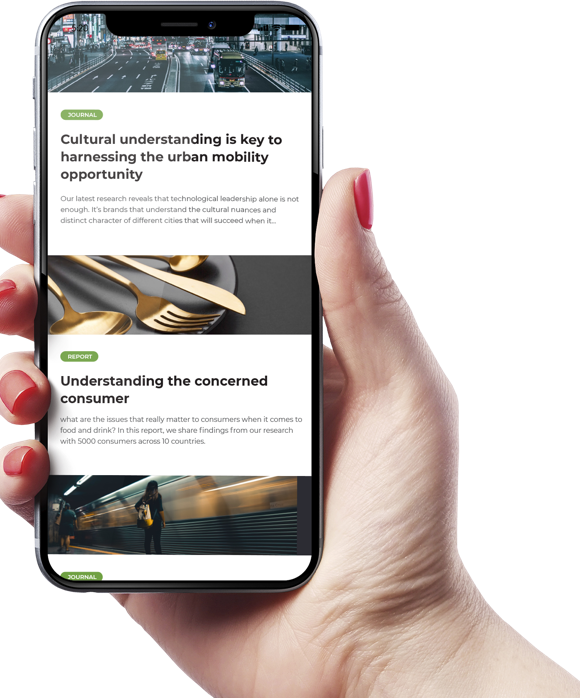
How is international market research different from domestic research?
There are several key differentiating factors between domestic market research and international market research. Here are three of the key differences:
1. You’re entering a market with social and cultural differences
Domestic market research is already tricky, but the often vast differences between your home country and your target country make international market research much more challenging in many ways.
Often, the reasons for this difficulty are the same reasons why you need to research in the first place — you need to learn as much as possible about a region and culture that may be entirely unlike your own.
The differences between countries can create many challenges for researchers. For example, a research method like one-on-one interviews that work well in western countries like the UK and US may fail miserably in other parts of the world where it is considered suspicious.
2. There may be more restrictions around research
In addition to cultural and social differences, international markets also come with legal differences. While you might have a good understanding of how the law (as it relates to market research) works at home, the reality abroad may be very different.
You’ll need to be aware of an entirely new set of rules to avoid breaking them and ending up in legal trouble. One example is the USA’s TCPA, which forbids calling a cellphone using an automated dialing system.
Legal differences make it imperative to conduct legal research and coordinate with lawyers in your target market before beginning any research. Ending up on the wrong side of the law could be catastrophic.
3. It requires more investment
Conducting market research on your home soil can often be undertaken relatively cheaply. However, costs can quickly skyrocket doing research abroad. Seemingly simple things like hiring venues, running telephone interviews, and gathering people to interview can become exponentially more complicated when you’re doing it in a foreign country with people who speak another language.
You may find yourself needing to hire a small army of staff on the ground to help you carry out these tasks. To make things even more frustrating, the cheaper market research methods like email and online surveys don’t work nearly as well in developing countries with less widespread internet access.
8 reasons why companies need to research their international markets
Despite the additional challenges involved, international market research is simply unavoidable if entering a new market overseas. Here are some of the reasons why.
1. Differences in culture
The culture of your overseas target market may be completely different. Failing to research the culture of your target market adequately could result in serious blunders, which could seriously harm your market entry and brand reputation.
Cultural differences don’t have to be vast to cause significant problems. For example, in many African countries, containers are labeled with a picture of their contents. When baby nutrition company Gerber entered this market with their jars labeled with photos of babies, the reaction was understandably negative and seriously impacted sales.
2. Differences in laws and regulations
Laws and regulations don’t just have an impact on your market research methods. They can affect every part of your market entry process and how you conduct your business in your new market.
If you enter a new market without a comprehensive understanding of the law concerning your activities, you risk getting into legal trouble.
There are many different potential legal pitfalls to consider when entering a new market. Some examples are environmental regulations, tax laws, and laws that pertain to hiring new staff. On top of this, rules can change quickly, and what was legal five years ago might be a no-go today.
Understanding legal and regulatory differences is where one-off research isn’t enough — you’ll have to conduct regular and ongoing research as well as work with legal experts in your target market.
3. Differences in customer preferences
Customers in one country may have completely different preferences to those in another. Cultural differences can be due to the earlier issues, but they can also result from other factors.
When China began allowing its citizens to buy and own homes a few decades ago, US do-it-yourself chain Home Depot quickly capitalized on this new opportunity. Six years later, they closed all their Chinese stores, never to return.
The reason — they opened all their stores in the suburbs, but most middle-class Chinese citizens tend to live in apartment blocks in the cities, homes that don’t require or allow much renovation. This simple misunderstanding due to incomplete research led to the failure of Home Depot’s market entry attempt.
4. Understand the competition
When you enter a new market, you’ll need to compete with already existing brands. Brand competition is not easy — you’re already at a significant disadvantage compared to companies that have been established in that region for a long time and are well-known to the local consumers.
It’s essential to understand who you are competing against and — more importantly — how they have been able to succeed. What exactly is it that customers like about your competitors? What keeps them coming back? What has allowed them to gain and maintain a hold in your target market?
Answering these questions through research will give you valuable direction on what your brand must do to succeed. It will also highlight weaknesses in your competitors that you can address in your marketing.
5. Mitigate risk
Entering any new market is a risky venture, and that risk increases when you expand abroad. According to the Harvard Business Review , companies operating abroad faced far lower Return on Assets than those in domestic markets. Many of these companies do not survive the attempt.
Market research allows you to mitigate your risk by being as prepared as possible for the many challenges of entering a foreign market. You’ll better understand your customers and what they want, be more prepared to take on your competition, avoid legal issues, and have a more viable strategy.
Entering a new market overseas will never be risk-free, but research allows you to minimize that risk.
6. Logistical challenges
The logistical challenges involved in entering a foreign market can be enormous. Everything from selecting and evaluating suppliers to finding ways to transport your products around your new market, there are many things to consider.
When entering a market in the developing world, these challenges become compounded. Regions without well-established transport infrastructure, financial systems, labor laws, government, and so on can create an endless series of logistical challenges.
To prepare for this, you’ll need to research your new market rigorously. Understand all the potential issues facing you so you have time to prepare and aren’t caught unawares by a problem that might set back your operations by a significant amount.
7. Prepare a solid strategy and budget
A well-established strategy and budget plan is an essential starting point for any market entry process. The only way to do this effectively is through diligent market research.
Market research allows you to understand the costs of your new market, including unexpected expenses. It also helps you anticipate obstacles and challenges and flesh out your strategy in a way that boosts your chances of success.
Suppose you need to win the support of high-level stakeholders in your organization. In that case, a well-prepared and financed strategy is an excellent way to convince them that your market entry attempt is well-placed to go ahead.
8. Find available marketing channels
Marketing your product in a foreign market comes with a unique set of challenges and considerations. Channels that work well in your home country may fail abroad — for example, digital marketing in a country with poor internet access.
On top of that, your messaging will need to consider all the cultural and linguistic characteristics of your target market. An advertising campaign that works well at home may very well perform terribly on the other side of the world.
Market research is a great way to identify the marketing channels and approaches that typically work well for similar products in your target market, helping you plan an effective marketing strategy and boost your chances of success from the start.
Market research is an essential and unavoidable task if you want to enter a foreign market successfully. Done right, it can help reduce the many risks involved and give your product the best possible chances of succeeding in a market that may be radically different from the ones you currently operate.
Contact Kadence to learn more about how we can help you with international market research , along with all other kinds.
Helping brands uncover valuable insights
We’ve been working with Kadence on a couple of strategic projects, which influenced our product roadmap roll-out within the region. Their work has been exceptional in providing me the insights that I need. Senior Marketing Executive Arla Foods
Kadence’s reports give us the insight, conclusion and recommended execution needed to give us a different perspective, which provided us with an opportunity to relook at our go to market strategy in a different direction which we are now reaping the benefits from. Sales & Marketing Bridgestone
Kadence helped us not only conduct a thorough and insightful piece of research, its interpretation of the data provided many useful and unexpected good-news stories that we were able to use in our communications and interactions with government bodies. General Manager PR -Internal Communications & Government Affairs Mitsubishi
Kadence team is more like a partner to us. We have run a number of projects together and … the pro-activeness, out of the box thinking and delivering in spite of tight deadlines are some of the key reasons we always reach out to them. Vital Strategies
Kadence were an excellent partner on this project; they took time to really understand our business challenges, and developed a research approach that would tackle the exam question from all directions. The impact of the work is still being felt now, several years later. Customer Intelligence Director Wall Street Journal
Get In Touch
" (Required) " indicates required fields
Privacy Overview
What Is Market Research and Why It Is So Important?
Regardless of the field of business in question, it is so important to do the essential preliminary research before starting a new study.

Regardless of the field of business in question, it is so important to do the essential preliminary research before starting a new study. This also applies to the preparation stages of the products and services to be launched before they are put on the market. Information stands out as the most valuable element at this point. This accurate and detailed information embodies the feasibility the entrepreneur or company management needs before the fundraising initiatives.
What Is market research ?
What needs it will meet, what its advantages may be, cost calculation, defining customer profiles, detailed analysis of competitors in the market, possible market share, and results; gives concrete clues about the future of that product or service. This whole process is called market research. Market research is also one of the main factors that specify how the product can positively differentiate from its competitors in the same category and designs the brand strategy to overcome possible marketing difficulties.
How is market research done?
The first step of successful market research starts with asking the right questions. The main questions to be asked during market research can be summarized as follows:
• What problem has not defined yet the product or service bring a solution?
• In the potential customer base, which segments would be positive and which would be not?
• Is the product or service sustainable for both the customer and the company?
• The parameters such as logistics, distribution, dealer network, etc. were taken into account?
• Is the product's benefit-cost ratio attractive or not?
In addition to these goods and service-oriented questions, the questions about the typical features of the market, and the customer profiles are equally important. Questions such as the market volume in the country, its expected growth in the future, the state of being affected by technological developments, and changes in social consumption habits are related to market characteristics.
In market research where you will finally get useful results, customers who are the final destination of the sales and marketing process should never be ignored. The social structures of your targeted potential customers, their economic strength, under which conditions they display consumer behavior, and their lifestyles are really important. Because all of this depends on how to address them, in short, which marketing messages should be chosen; it also forms the core of the communication strategy, including promotion and advertising work.
Competitor analysis and strategy determination
In marketing research, after the questions in terms of product and service, market situation, and customer, competitor analysis comes. The competitors in the market should be listed. If these researches focus on direct and indirect competitors, the analysis work more smoothly.
Afterward, the strengths and weaknesses of the competitors were analyzed in the light of these data. The exchange of seminal ideas and the acquisition of qualitative and quantitative information about pricing policies, customer reviews about these products and services, the reasons why they prefer them, etc. are essentials for a collective feasibility.
Following these steps, preliminary preparations begin to determine the marketing strategy. A wide range of strategic decisions is made, ranging from product packaging to after-sales customer support, what kind of campaigns will be organized the distribution network, the direction of the advertisements, and promotional activities.
What are the methods to be used for marketing research?
Although market research varies depending on the nature of the product or service, the market volume in the country to be marketed, and the consumer needs it meets, it is based on two methods.
Quantitative research : In this research method, which is based on statistical results are obtained from the information through face-to-face meetings, phone calls, and online interviews about the product or service to be marketed. Computer-assisted phone calls and personal calls made in this way are also considered under this category.
Qualitative research : Qualitative research, conducted on a more limited group scale and based on deep observations, provides the insight needed directly from people. Focus group studies are the most popular example of these studies. the interviews for marketing research have their own positive and negative sides. For example; although telephone calls are quick and low-cost, it is not a communication method that can be performed along the day, because of the usual routine of the people to whom the questions are directed.
Group surveys consist of the impressions that large manufacturers or service providers get from focus group discussions. Inferences from collective interviews and the exchange of ideas about the purchasing decisions of potential customers from different segments with different consumption habits are important steps in this process. In-depth interviews conducted under more specific and specific conditions develop on questions prepared before the interview and aim to reach as much information as possible about the product or service with the least questions.
Asks visually aided questions to users who visit the website of manufacturers and service providers, Typeform is a useful marketing research tool in measuring customer habits.
Google Forms
The most important advantage of Google Forms offered within the scope of Google office applications is that it can direct the questions determined to all customers, regardless of current and potential. With this marketing research method, which can be used in both quantitative and qualitative studies, the answers can be brought together and new inferences can be made from it.
Google Insight
The digital world, which is the essential and largest source of information in today's world, also plays an important role in the marketing research process. In this context, one of the most well-known tools is the Google Insight database. Especially e-commerce, online sales, etc. If it is desired to sell in different forms such as e-commerce or social commerce; it is possible to reach a lot of stimulating information thanks to the data collected by Google from different sources.
SurveyMonkey
SurveyMonkey, one of the most frequently used marketing research methods on the Internet, is a practical and functional survey application when the right questions are asked. It has both paid and free versions, and the customers can be known closer, deep analysis can be done, consumer behaviors can be defined clearly, and the current situation of the market can be more understandable.
Corporate meetings are a part of the implementation phase of marketing research methods. Especially, large-scale fairs, corporate summits, and seminars, conferences, etc. promotional and sales activities are one of the first application areas of marketing research. Usually, the outputs of one-to-one interviews with customers at such events where products appear for the first time can be converted into quantitative or qualitative data.
It is very important to choose a strong infrastructure provider for these events that are rapidly moving from physical areas to the digital environment due to the Covid-19 pandemic. Endless Fairs is a solution partner that makes your virtual events more efficient and offers so many design ideas for the digital event spaces. It guides you in many different digital activities such as webinars, virtual fairs, sectoral meetings, etc. Thanks to its experience and provides tailored professional services.

The Most Creative Virtual Event Ideas for 2021
If you haven't hosted a virtual event before and are confused about the type of event you can host, this blog post is for you!

What Is Guerilla Marketing and Why It Is So Effective?
It’s possible to create a deep influence less costly on target audience, thanks to guerilla marketing tactics and projects! But, what is guerilla marketing exactly?

Get the Reddit app
For market research and insight professionals or students to talk about everything related to the world of market research. Qualitative, quantitative and methods in between. No surveys unless you're looking for survey critique, of which there is plenty. Temporary short-term bans will be handed out for those ignoring the rules.
Why is market research important and how to do it properly
We see a lot of companies succeeding and a lot of companies failing, and in many cases the outcome is based on a very critical step in any business. The name of this step is market research.
It's the base of any successful company. Having an optimistic vision of things, being a dreamer, or a believer are good. However, without data covering your back, it can get tough to survive.
Companies conduct market research for different purposes. Some examples:
Starting a new business
Entering a new market
Staying ahead of marketing trends
... and much more.
The markets are transforming, consumer behavior is changing, and without a proper market research it would be hard to survive or launch a new successful business. Check out this article about the types of market research and the tools you can use to conduct it - https://blog.truepublic.com/market-research/ .
By continuing, you agree to our User Agreement and acknowledge that you understand the Privacy Policy .
Enter the 6-digit code from your authenticator app
You’ve set up two-factor authentication for this account.
Enter a 6-digit backup code
Create your username and password.
Reddit is anonymous, so your username is what you’ll go by here. Choose wisely—because once you get a name, you can’t change it.
Reset your password
Enter your email address or username and we’ll send you a link to reset your password
Check your inbox
An email with a link to reset your password was sent to the email address associated with your account
Choose a Reddit account to continue
Kamala Harris has put the Democrats back in the race

IMAGES
VIDEO
COMMENTS
Advantages of market research. Market research helps you identify your greatest strengths, threats, and opportunities. It can help you find your way when markets become tough to predict and find efficient ways to grow your business. Online market research can help the whole business at any stage of its life.
Understanding why market research is so important helps in refining and targeting campaigns through relevant data. ... Understanding the importance of market research is key because it is an extremely powerful tool that furnishes data and insight needed for making sound decisions, gaining a competitive edge, and experiencing growth. ...
Conducting market research helps you identify those areas. It also helps you discover and understand your customers' needs so you can innovate better, expand when the time is right, and work with more focus. In this article below, we will share a few pointers with you about why market research is important for every business - big and small.
The Importance of Marketing Research. These are the ten reasons why market research is important, especially for smaller teams and businesses: 1. Better Understand Customer Needs. While every business has many stakeholders, the customer is always at the center of what you do.
Market research is the mainstay of any marketing strategy. It gives you in-depth insights into the marketplace (including your competition) and your target consumers so that you can meet their expectations. The findings from good market research enable decision-makers to make important decisions that benefit the business and increase sales and ...
6. Investigate expansion opportunities. Market research helps you identify areas for possible business expansion. Given that it offers the opportunity to test markets to determine if there is room for a new product or service. You can also conduct market research to find the best location to open a new store. 7.
Final Notes: Why Is Market Research Important. In wrapping up our exploration of the vital role of market research, it's clear that its impact extends far beyond mere data collection. It is the foundation upon which successful businesses build their strategies, innovate, and connect with their customers on a deeper level. ...
The Value of Market Research. The value of market research rests in its ability to help you determine marketing strategies and products. If you don't engage in regular market research, you'll avoid determining why some customers don't come back. Avoiding this information prevents you from rerouting your strategy before it's too late.
Market research gives you certainty. Market research allows you to study the market that you are involved in, discovering valuable information and insights about your customers, your competitors, and the product/ service that you plan to offer. All of this can be obtained before committing to new business ventures, helping your company to make ...
Market research is a vital element when developing your marketing strategy. When done correctly it can help to enlighten your marketing activities - such as understanding the requirements of your target audience, helping to understand what key messages you should convey and how to convey them. It should be treated as an ongoing activity ...
5 Reasons Why Market Research Is Important. Market research gets you into a customer-centric mindset. Market research allows you to communicate more effectively with your customers. Market research minimizes risk. Market research ensures your business decisions are backed by data. Market research allows you to stay competitive.
Market research is an essential tool for businesses seeking to understand their target market, identify opportunities, and make informed decisions. By gathering and analyzing data about consumer preferences, industry trends, and competitor activities, businesses can gain valuable insights that drive growth, innovation, and competitive advantage.
Market research is the process of evaluating the success metrics within an industry and against competitors to reveal a company's best target market audience. It enhances business development planning, marketing programs, and brand equity through research conducted directly with potential customers. In the context of tourism and passenger ...
Here are some additional resources to further explore the importance of market research: Why Is Market Research So Important? Short Description: Delve into the key reasons why market research is an essential aspect of any business strategy, uncovering its impact on decision-making and growth.
Despite the additional challenges involved, international market research is simply unavoidable if entering a new market overseas. Here are some of the reasons why. 1. Differences in culture. The culture of your overseas target market may be completely different. Failing to research the culture of your target market adequately could result in ...
In market research where you will finally get useful results, customers who are the final destination of the sales and marketing process should never be ignored. The social structures of your targeted potential customers, their economic strength, under which conditions they display consumer behavior, and their lifestyles are really important.
The name of this step is market research. It's the base of any successful company. Having an optimistic vision of things, being a dreamer, or a believer are good. However, without data covering your back, it can get tough to survive. Companies conduct market research for different purposes. Some examples: Starting a new business.
What is market research? Market research: the "systematic gathering, recording, and analyzing of data with respect to a particular market, where 'market' refers to a specific group in a specific geographic area." Marketing research is the systematic and objective identification, collection, analysis, dissemination, and use of information.
Marketing Chapter 4. What is marketing research? Why is it important? Click the card to flip 👆. Marketing research is the systematic design, collection, interpretation, and reporting of information to help marketers solve specific marketing problems or take advantage of market opportunities. It is important because it can help a firm better ...
"What is Market Research?" It can be described more the action of gathering, how plus interpreting information to helping solve marketing challenging. Is cans be described than the action of gathering, analysing and interpreters information till help solve marketing challenges.
The role of marketing research is to assess information needs, market decision making and provide information. Marketing research is important because we need to identify marketing opportunities and problems; generate, refine and evaluate potential marketing actions; and monitor marketing performance.
Market research is the objective process for generating information to help you make strategic business and marketing decisions. Marketing is an essential part of business. However to ensure your marketing plan is successful, it is essential for a business to take a customer view across the marketing mix. Whether it is products, or pricing ...
Our forecast shows the Democrats are back in the race
After reaching the top of the market cap charts in June and becoming the most valuable company in the world, Nvidia plunged in value and lost about $900 billion in market cap over the next seven weeks. Related: Nvidia CEO Jensen Huang Turned Down a Merger Offer in the Company's Early Days, According to Insiders. Here's Why.